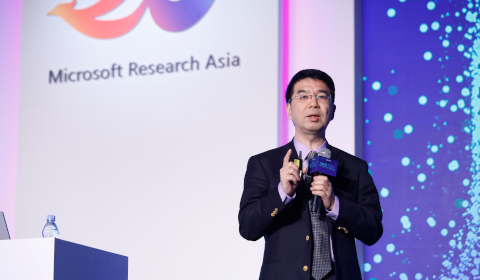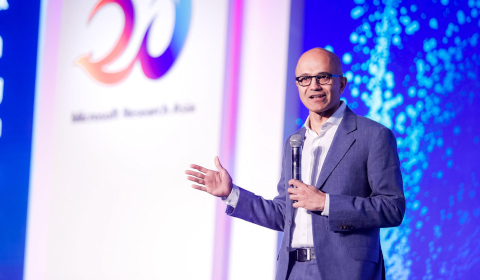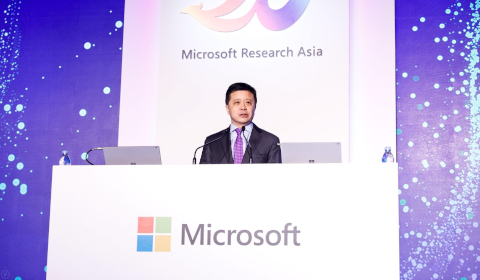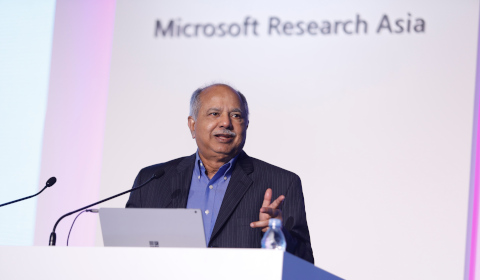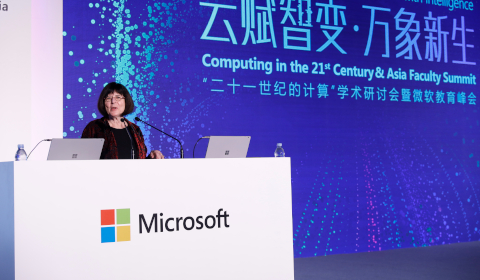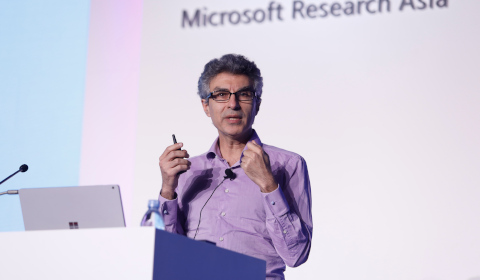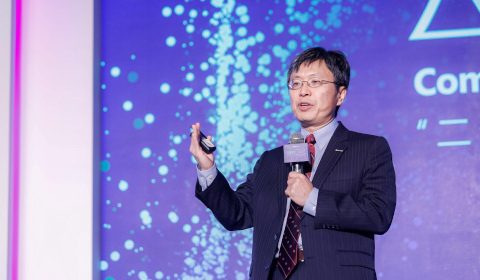首页

我们正置身于一个激动人心的时代,见证一股强大的颠覆性技术浪潮席卷全球——在云计算与人工智能的驱动下,数字化转型方兴未艾。以人工智能、混合现实和量子计算为代表的重大科技突破将深刻影响每个人的生活乃至改写整个人类社会。萨提亚·纳德拉在新作《刷新:重新发现商业与未来》中探讨了个人、企业及整个社会如何能够且必须实现转型——坚持对新能源、新思维、以及社会关联和更新的不断探索。
2018年恰逢微软亚洲研究院成立二十周年。每当回顾二十年来的精彩点滴、庆祝每一次取得的卓越成绩,我们都特别感谢来自各界的支持。我们十分幸运能与微软、与中国、与各位一道在时代激流中稳健成长,也同样为我们合力收获的劳动果实而倍感骄傲。在继续钻研技术创新的同时,我们也应该适时总结反思、重整旗鼓,为下一个二十年及更久远的未来高瞻远瞩。
以“云赋智变,万象新生”为主题的第二十届“二十一世纪的计算”国际学术研讨会暨微软教育峰会将于2018年11月6日、7日在中国北京召开。“二十一世纪的计算”国际学术研讨会是中国及亚太地区规模最大、影响力最广的计算机科学教育与研究的盛会之一。迄今为止,会议已成功举办十九届,足迹遍布中国、日本、韩国、新加坡等多个国家和地区,累计参会人数超过40,000人。
今年的会议由微软亚洲研究院主办,在教育部国际司的大力支持和教育部中外人文交流中心积极参与下,同时作为“中国高校人工智能人才国际培养计划”2018年国际人工智能专家论坛,并有幸邀请到多位全球计算机科学与人工智能领域的大师级人物,包括蒙特利尔学习算法研究所(MILA)创始人兼负责人Yoshua Bengio教授;卡内基梅隆大学计算机学院杰出教授Lenore Blum博士;美国电气和电子工程师协会(IEEE)院士、美国计算机协会(ACM)院士、美国国家工程院(NAE)院士丛京生教授;图灵奖获得者、美国国家科学院(NAS)院士、美国国家工程院(NAE)院士及中国科学院(CAS)外籍院士John E. Hopcroft教授;图灵奖获得者、美国国家科学院(NAS)院士、美国国家工程院(NAE)院士及英国皇家学会外籍院士Butler Lampson博士;图灵奖获得者、美国电气和电子工程师协会(IEEE)院士、美国人工智能协会(AAAI)院士Raj Reddy教授;图灵奖获得者、中国科学院(CAS)院士、美国国家科学院(NAS)外籍院士、美国计算机协会(ACM)院士姚期智教授及新加坡国立大学副校长、美国电气和电子工程师协会(IEEE)院士Tsuhan Chen教授。同时,微软全球执行副总裁沈向洋博士、微软全球资深副总裁Peter Lee博士,和微软全球资深副总裁、微软亚太研发集团主席兼微软亚洲研究院院长洪小文博士也将到场共饕学术盛宴。
这是一个“智变”的时代、一个求新的时代。技术革新与日俱增,智能应用层出不穷,计算机科学正以惊人之势重塑人类未来。技术浪潮席卷下的明天将会以何种面貌呈现,我们希望莅临的诸位能与我们一起探讨。
值此佳际,我们诚邀您出席本次活动,与我们回顾往昔,予力未来,携手开启下一段精彩里程。
大会主席
 周礼栋
周礼栋
微软亚洲研究院副院长
主讲嘉宾
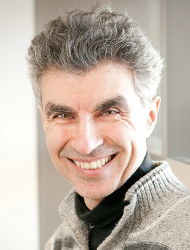 Yoshua Bengio
Yoshua Bengio
蒙特利尔大学计算机科学与运筹学系教授
蒙特利尔学习算法研究所(MILA)创始人兼负责人,加拿大皇家学院(RSC)及加拿大高等研究院(CIFAR)院士
Bio
Yoshua Bengio (computer science PhD, 1991, McGill U; post-doc at MIT and Bell Labs, computer science professor at U. Montréal since 1993): he authored three books, over 500 publications (h-index 122, over 132,000 citations), mostly in deep learning, holds a Canada Research Chair in Statistical Learning Algorithms, is Officer of the Order of Canada, recipient of the Marie-Victorin Quebec Prize 2017, Fellow of the Royal Society of Canada, and he is a CIFAR Senior Fellow and co-directs its Learning in Machines and Brains program. He is scientific director of the Mila, Quebec Artificial Intelligence Institute, currently the largest academic research group on deep learning. He is on the NIPS foundation board (previously program chair and general chair), co-created the ICLR conference (specialized in deep learning) and is scientific co-director of IVADO. He pioneered deep learning and his goal is to contribute to uncover the principles giving rise to intelligence through learning, as well as favour the development of AI for the benefit of all.
Keynote Abstract
Challenges for Deep Learning towards Human-Level AI
Humans seem to be much more efficient than current AI at learning from unlabeled observations and interaction with their environment, and current machine learning systems do not seem to understand their training data nearly as well as humans. A core objective of deep learning is to come up with learning frameworks which can discover disentangled representations which explain the important variations in the data. Progress in deep generative networks based on an adversarial criterion has been impressive and we show how these ideas can be used to estimate and optimize entropy and mutual information. and how this could be used towards unsupervised learning of high-level abstractions. This follows the ambitious objective of disentangling the underlying causal factors explaining the observed data. We argue that natural language understanding cannot come from current attempts purely based on text corpora. Instead, a learning agent must acquire information by acting in the world and jointly learn a model of the world and how languge can be used to refer to it. Natural language could be used as an additional hint about the abstract representations and disentangled factors which humans have discovered to explain their world. Some conscious thoughts also correspond to the kind of small nugget of knowledge (like a fact or a rule) which have been the main building blocks of classical symbolic AI. This therefore raises the interesting possibility of addressing some of the objectives of classical symbolic AI focused on higher-level cognition using the deep learning machinery augmented by the architectural elements necessary to implement conscious thinking about disentangled causal factors.
[演讲视频]
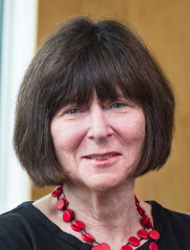 Lenore Blum
Lenore Blum
卡内基梅隆大学计算机科学系杰出教授
美国数学学会(AMS)院士
Bio
Lenore Blum (PhD, MIT) is Distinguished Career Professor of Computer Science at Carnegie Mellon University (CMU) where she is also Chair in Technology Entrepreneurship and Founding Director of Project Olympus, a proof-of-concept innovation center she founded in 2007 that works with faculty and students to bridge the gap between cutting-edge university research/innovation and economy-promoting commercialization. Since 2007, over half the Carnegie Mellon start-ups have come through Project Olympus. Project Olympus is a good example of Lenore Blum’s determination to make a real difference in the academic community and the world beyond.
Lenore is internationally recognized for her work in increasing the participation of girls and women in Science, Technology, Engineering, and Math (STEM) fields. She was founding co-Director of the Math/Science Network and its Expanding Your Horizons conferences which has served over one million middle and high school girls since inception in the early 1970s. In 1974, Lenore founded the Mills College Computer Science Department, the first at any women’s college on the planet. Arriving at CMU in 1999, she founded the Women@SCS program --currently half the CS majors at CMU are women. In 2004 Lenore received the US Presidential Award for Excellence in Science, Mathematics, and Engineering Mentoring. In 2009 she received the Carnegie Science Catalyst Award and in 2018, she received Carlow University’s Women of Spirit Award and the Lifetime Achievement Award from Simmons University.
Lenore has served the professional community in numerous capacities, including as third President of the Association for Women in Mathematics and Vice President of the American Mathematical Society (AMS). She has taught at the University of California at Berkeley, was a Senior Researcher at the International Computer Science Institute and Deputy Director of the Mathematical Sciences Research Institute, both also in Berkeley. Lenore is a Fellow of the American Association for the Advancement of Science and inaugural fellow of the AMS and the AWM.
Lenore’s research, from her early work in model theory and differential fields (logic and algebra) to her more recent work in developing a theory of computation and complexity over the real numbers (mathematics and computer science), has focused on merging seemingly unrelated areas. Lenore is excited by her new research (with her husband Manuel and son Avrim) on creating a mathematical model for a “conscious AI.”
Keynote Abstract
Towards a Conscious AI: A Computer Architecture Inspired by Cognitive Neuroscience
Thanks to major advances in neuroscience, we are on the brink of a scientific understanding of how the brain achieves consciousness. This talk will describe cognitive neuroscientist Bernard Baars' Global Workspace Model (GWM) of the brain, its implications for understanding consciousness, and a formal computer architecture that it inspires. The elder Blums were ecstatic to learn that the younger Blum’s “sleeping experts” algorithm was just what was needed to decide which unconscious processors get onto the conscious stage. The Model gives insight for the design of machines that truly experience (as opposed to simulate) feelings such as joy and pain.
[演讲视频]
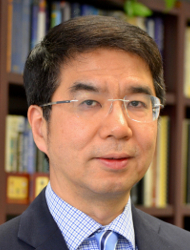 丛京生
丛京生
加州大学洛杉矶分校计算机科学系杰出校长讲席教授
美国计算机协会(ACM)、美国电气和电子工程师协会(IEEE)及美国国家工程院(NAE)院士
Bio
JASON CONG received his B.S. degree in computer science from Peking University in 1985, his M.S. and Ph. D. degrees in computer science from the University of Illinois at Urbana-Champaign in 1987 and 1990, respectively. Currently, he is a Distinguished Chancellor’s Professor at the Computer Science Department, also with joint appointment from the Electrical Engineering Department, of University of California, Los Angeles, the director of Center for Domain-Specific Computing (CDSC), and the director of VLSI Architecture, Synthesis, and Technology (VAST) Laboratory. He served as the chair the UCLA Computer Science Department from 2005 to 2008. Dr. Cong’s research interests include novel architectures and compilation for customizable computing, synthesis of VLSI circuits and systems, and highly scalable algorithms. He has over 400 publications in these areas, including 11 best paper awards, three 10-Year Most Influential Paper Awards, and the first paper inducted to the FPGA and Reconfigurable Computing Hall of Fame. He and his former students co-founded AutoESL, which developed the most widely used high-level synthesis tool for FPGAs (renamed to Vivado HLS after Xilinx’s acquisition). He was elected to an IEEE Fellow in 2000, ACM Fellow in 2008, and the National Academy of Engineering in 2017.
Keynote Abstract
Automating Customizable Computing —Democratizing Accelerator Designs at the Edge and in the Cloud
In the past decade, CDSC has been exploring customizable computing, which emphasizes extensive use of customized accelerators on programmable fabrics for much greater performance and energy efficiency. With Intel’s $17B acquisition of Altera in 2015 and large-scale deployment of FPGAs in both private and public clouds in the past two years, customizable computing is going from advanced research into mainstream computing.
Although the performance and energy efficiency benefits of customizable computing have been clearly demonstrated, a significant challenge, however, is the efficient design and implementation of various accelerators on FPGAs. It presents a significant barrier to many software programmers. In this talk, I shall talk about our effort on developing an automated compilation flow from high-level programming languages to FPGAs. I start with a quick review of our early work on high-level synthesis. Then, I shall present our recent effort on source-code level transformation and optimization for customizable computing, including support of high-level domain-specific languages (DSL) for deep learning (e.g. Caffe), imaging processing (e.g. Halide), and big-data processing (e.g. Spark), and support automated compilation to customized microarchitecture templates, such as systolic arrays, stencils, and CPP (composable parallel and pipelined).
[演讲视频]
 洪小文
洪小文
微软全球资深副总裁,微软亚太研发集团主席兼微软亚洲研究院院长
美国电气和电子工程师协会(IEEE)院士
Bio
Dr. Hsiao-Wuen Hon is corporate vice president of Microsoft, chairman of Microsoft’s Asia-Pacific R&D Group, and managing director of Microsoft Research Asia. He drives Microsoft’s strategy for research and development activities in the Asia-Pacific region, as well as collaborations with academia.
Dr. Hon has been with Microsoft since 1995. He joined Microsoft Research Asia in 2004 as deputy managing director, stepping into the role of managing director in 2007. He founded and managed Microsoft Search Technology Center from 2005 to 2007 and led development of Microsoft’s search products (Bing) in Asia-Pacific. In 2014, Dr. Hon was appointed as chairman of Microsoft Asia-Pacific R&D Group.
Prior to joining Microsoft Research Asia, Dr. Hon was the founding member and architect of the Natural Interactive Services Division at Microsoft Corporation. Besides overseeing architectural and technical aspects of the award-winning Microsoft Speech Server product, Natural User Interface Platform and Microsoft Assistance Platform, he was also responsible for managing and delivering statistical learning technologies and advanced search. Dr. Hon joined Microsoft Research as a senior researcher in 1995 and has been a key contributor to Microsoft’s SAPI and speech engine technologies. He previously worked at Apple, where he led research and development for Apple’s Chinese Dictation Kit.
An IEEE Fellow and a distinguished scientist of Microsoft, Dr. Hon is an internationally recognized expert in speech technology. Dr. Hon has published more than 100 technical papers in international journals and at conferences. He co-authored a book, Spoken Language Processing, which is a graduate-level textbook and reference book in the area of speech technology used in universities around the world. Dr. Hon holds three dozen patents in several technical areas.
Dr. Hon received a Ph.D. in Computer Science from Carnegie Mellon University and a B.S. in Electrical Engineering from National Taiwan University.
Keynote Abstract

Eric Horvitz
微软技术院士、微软研究院院长
美国计算机协会(ACM)院士、美国国家工程院(NAE)院士、美国人工智能协会(AAAI)院士
Bio
Eric Horvitz is a technical fellow and director at Microsoft Research. He has made contributions in areas of machine learning, perception, natural language understanding, decision making, and human-AI collaboration. His efforts and collaborations have led to fielded systems in healthcare, transportation, ecommerce, operating systems, and aerospace. He received the Feigenbaum Prize and the Allen Newell Prize for contributions to AI. He has been elected fellow of the National Academy of Engineering (NAE), the Association of Computing Machinery (ACM) , Association for the Advancement of AI (AAAI), and the American Academy of Arts and Sciences. He has served as president of the AAAI, and on advisory committees for the National Science Foundation, National Institutes of Health, President’s Council of Advisors on Science and Technology, DARPA, and the Allen Institute for AI. Beyond technical work, he has pursued efforts and studies on the influences of AI on people and society, including issues around ethics, law, and safety. He established the One Hundred Year Study on AI and served as a founder and co-chair of the Partnership on AI to Support People and Society. Eric received PhD and MD degrees at Stanford University. More information can be found on his home page. A list of publications can be found here.
Keynote Abstract
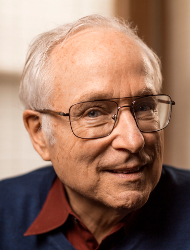 Butler Lampson
Butler Lampson
微软新英格兰研究院技术院士
1992年图灵奖获得者,英国皇家学会外籍院士,美国国家科学院(NAS)及美国国家工程院(NAE)院士
Bio
Butler Lampson is a Technical Fellow at Microsoft Corporation and an Adjunct Professor at MIT. He has worked on computer architecture, local area networks, raster printers, page description languages, operating systems, remote procedure call, programming languages and their semantics, programming in the large, fault-tolerant computing, transaction processing, computer security, WYSIWYG editors, and tablet computers. He was one of the designers of the SDS 940 time-sharing system, the Alto personal distributed computing system, the Xerox 9700 laser printer, two-phase commit protocols, the Autonet LAN, the SPKI system for network security, the Microsoft Tablet PC software, the Microsoft Palladium high-assurance stack, and several programming languages. He received the ACM Software Systems Award in 1984 for his work on the Alto, the IEEE Computer Pioneer award in 1996 and von Neumann Medal in 2001, the Turing Award in 1992, and the NAE’s Draper Prize in 2004. He is a member of the US National Academies of Sciences and of Engineering, and a Foreign Member of the Royal Society.
Keynote Abstract
Computer Technology and Public Policy
As computing becomes pervasive in society, there are many cases where technology must work hand-in-hand with regulation or social processes. Here are three examples: (1) As a technology, blockchain does not deserve the hype that it gets. Its true value is shock value: many established practices could have been drastically improved by computers 15 years ago, but inertia has kept them unchanged. Now people ask, “What are you doing about blockchain?” and if you don’t have an answer you look like an idiot, even though usually the answer has little to do with blockchain. (2) Soon there will be lots of IoT devices can kill people if they malfunction, whether the cause is bugs or hacking. To make them safe, they need two things: a secure foundation, and an architecture that entrusts safety to a well-isolated component that is simple enough to be formally verify. (3) People want is a sense of control over their online data. Control means that you can tell who has your data, limit what they can do with it, and change your mind about the limits. There will not be a single worldwide regulatory regime, but it does seem possible to have common technical mechanisms that support regulation.
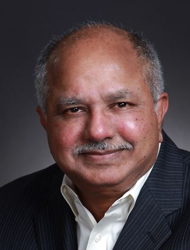 Raj Reddy
Raj Reddy
卡内基梅隆大学计算机科学系教授
1994年图灵奖获得者,美国电气和电子工程师协会(IEEE)及美国人工智能协会(AAAI)院士
Bio
Raj Reddy is a University Professor of Computer Science and Robotics, and Moza Bint Nasser Chair at Carnegie Mellon University. He was an Assistant Professor at Stanford from 1966-69 and Faculty Member at Carnegie Mellon since 1969. He served as the founding Director of the Robotics Institute from 1979 to 1991 and the Dean of School of Computer Science from 1991 to 1999.
He has been active in AI research for over five decades in the areas of AI, Speech Understanding, Image Understanding, Robotics, Multi-sensor Fusion, and Intelligent Agents.Dr. Reddy's current research interests include: Technology in Service of Society, Voice Computing for the 3B semi-literate populations at the bottom of the pyramid, Digital Democracy, and Learning Science and Technologies.He is a member of the National Academy of Engineering and a foreign member of China Academy Engineering. He served as co-chair of President Clinton’s Information Technology Advisory Committee (PITAC) from 1999 to 2001. Dr. Reddy is the recipient of the Legion of Honor in 1984, the ACM Turing Award in 1994, the Padma Bhushan in 2001, the Honda Prize in 2005 and Vannevar Bush Award in 2006.
Keynote Abstract
AI: Background, History and Future Opportunities
There has been a lot hype and misinformation about AI in the media recently. Many of these predictions will not happen. Robots will not take over the world. In this talk, we will review tools, techniques and advances in AI over the past half century and explore what might be next. We will present two types of Intelligent Assistants, namely, Cognition Amplifiers that will enable us to do many daily tasks faster and with less effort and Guardian Angels that will provide us with superhuman capabilities, to do tasks previously impossible for humans. We will present a possible Architecture of Intelligent Agents and the creation of Intelligent Agent market place.
[演讲视频]
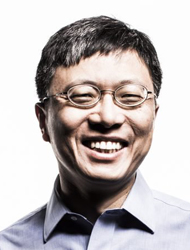 沈向洋
沈向洋
微软全球执行副总裁,微软人工智能及微软研究事业部负责人
美国计算机协会(ACM)、美国电气和电子工程师协会(IEEE)及美国国家工程院(NAE)院士、英国皇家工程院(RAE)外籍院士
Bio
Harry Shum is executive vice president of Microsoft’s Artificial Intelligence (AI) and Research group.He is responsible for driving the company’s overall AI strategy and forward-looking research and development efforts spanning infrastructure, services, apps and agents. He oversees AI-focused product groups including Bing and Cortana. He also leads Microsoft Research, one of the world’s premier computer science research organizations, and its integration with the engineering teams across the company.
Previously, Dr. Shum served as the corporate vice president responsible for Bing search product development from 2007 to 2013. Prior to his engineering leadership role at Bing and online services, he oversaw the research activities at Microsoft Research Asia and the lab’s collaborations with universities in the Asia Pacific region, and was responsible for the Internet Services Research Center, an applied research organization dedicated to advanced technology investment in search and advertising at Microsoft.
Dr. Shum joined Microsoft Research in 1996 as a researcher based in Redmond, Washington. In 1998 he moved to Beijing as one of the founding members of Microsoft Research China (later renamed Microsoft Research Asia). There he began a nine-year tenure as a researcher, subsequently moving on to become research manager, assistant managing director and managing director of Microsoft Research Asia and a Distinguished Engineer.
Dr. Shum is an IEEE Fellow and an ACM Fellow for his contributions to computer vision and computer graphics. He received his Ph.D. in robotics from the School of Computer Science at Carnegie Mellon University. In 2017, he was elected to the National Academy of Engineering of the United States. In September 2018, he was elected an International Fellow of the Royal Academy of Engineering in honor of his outstanding engineering achievements.
Keynote Abstract
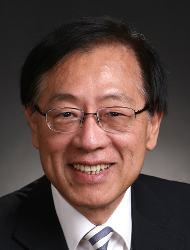 姚期智
姚期智
清华大学交叉信息研究院教授兼院长
2000年图灵奖获得者,中国科学院(CAS)院士,美国国家科学院(NAS)外籍院士,美国计算机协会(ACM)院士
Bio
Andrew Chi-Chih Yao is Dean of the Institute for Interdisciplinary Information Sciences at Tsinghua University, member of the Chinese Academy of Sciences, and foreign member of the US Academy of Sciences.
Professor Yao is a world-renowned computer scientist and pioneer in analysis of algorithms, cryptography and quantum computing. He was recipient of the Turing Award in 2000 and to date the only Chinese scientist receiving this highest honor in computer science. Professor Yao was previously on the faculty at MIT, Stanford, UC Berkeley and Princeton University before joining Tsinghua in 2004. He founded the Tsinghua Center for Quantum Information and Institute for Interdisciplinary Information Sciences in 2011. Outside of Tsinghua, Professor Yao built the Turing AI Institute (Nanjing) and the Interdisciplinary Core Technology Institute (Xian) in 2018 to enable close innovation partnerships with municipalities.
Keynote Abstract
The Advent of Quantum Computing
In recent years, scientists have made much progress in the theory and implementation of quantum computing. Many now believe that the exciting prospect of building a real quantum computer will happen before long. Common curiosity drives one to ask: What advantages might quantum computers hold over traditional ones? What secrets in the quantum world could be unlocked to produce enormous power for computing and information processing? In this talk, we will take an in-depth look into the above questions. We will also remark on the present and future of quantum computing.
[演讲视频]
Panelists:
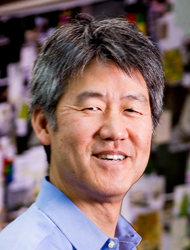 Peter Lee
Peter Lee
微软全球资深副总裁
美国计算机协会(ACM)院士
Bio
Dr. Peter Lee is Corporate Vice President, Microsoft Healthcare. He leads an organization that works on technologies for better and more efficient healthcare, with a special focus on artificial intelligence and cloud computing. Dr. Lee has extensive experience in managing the process of going from basic research to commercial impact. Past illustrative examples include the deep neural networks for simultaneous language translation in Skype, next-generation IoT technologies, and innovative silicon and post-silicon computer architectures for Microsoft’s cloud. He also has a history of advancing more “out of the box” technical efforts, such as experimental under-sea datacenters, augmented-reality experiences for HoloLens and VR devices, digital storage in DNA, and social chatbots such as XiaoIce and Tay.
Previously, as an Office Director at DARPA, he led efforts that created operational capabilities in advanced machine learning, crowdsourcing, and big-data analytics, such as the DARPA Network Challenge and Nexus 7. He was formerly the Head of Carnegie Mellon University’s computer science department. As a thought leader, he has spoken and written widely on technology trends and policies, spanning the fields of computing technology, healthcare, and innovation ecosystem. He is a member of the Boards of Directors of the Allen Institute for Artificial Intelligence and the Kaiser Permanente School of Medicine. He served on President’s Commission on Enhancing National Cybersecurity. He has led studies for the National Academies on the impact of federal research investments on economic growth and testified before the US House Science and Technology Committee and the US Senate Commerce Committee.
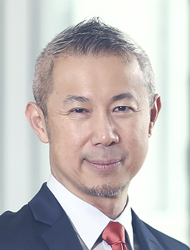 Tsuhan Chen
Tsuhan Chen
新加坡国立大学副校长
美国电气和电子工程师协会(IEEE)院士
Bio
Prof. Chen Tsuhan is the Deputy President (Research and Technology) and Distinguished Professor at National University of Singapore (NUS). He also serves as the Chief Scientist of AI Singapore, a national programme in artificial intelligence.
Prof. Chen is a renowned expert in pattern recognition, computer vision and machine learning. He joined NUS from Cornell University, Ithaca, New York, United States, where he had been the David E. Burr Professor of Engineering since 2009. From 2009 to 2013, when he served as Director, School of Electrical and Computer Engineering at Cornell, he promoted the School to top ranking positions and launched several initiatives to boost innovation as well as foster research and teaching excellence. He also directed the Advanced Multimedia Processing Laboratory. From 1997 to 2008, Prof. Chen was a Professor with the Department of Electrical and Computer Engineering, Carnegie Mellon University, Pittsburgh, Pennsylvania, USA, where he served as the Associate Department Head from 2007 to 2008.
Prof. Chen was the Cheng Tsang Man Chair Professor and Dean of the College of Engineering (CoE) at the Nanyang Technological University (NTU) from 2015 to 2017. He championed faculty recruitment and pioneered support schemes at the NTU CoE to encourage inter-school multidisciplinary programmes, aligned with the domain areas identified in RIE2020.
Prof. Chen was appointed the Editor-in-Chief for IEEE Transactions on Multimedia in 2002-2004. He was elected to the Board of Governors, 2007-2009, and a Distinguished Lecturer, 2007-2008, both with the IEEE Signal Processing Society.
Prof. Chen received the Charles Wilts Prize for outstanding independent research at the California Institute of Technology in 1993. He was a recipient of the US National Science Foundation CAREER Award from 2000 to 2003. He received the Benjamin Richard Teare Teaching Award in 2006, the Eta Kappa Nu Award for Outstanding Faculty Teaching in 2007, both at the Carnegie Mellon University, and the Michael Tien Teaching Award in 2014 at the Cornell University.
Prof. Chen has published more than 300 technical papers and holds close to 30 US patents. He is a member of the Phi Tau Phi Scholastic Honor Society, a Fellow of IEEE, and a Fellow of the Institute of Engineers, Singapore. He earned his PhD degree in electrical engineering from the California Institute of Technology, Pasadena, California, USA, in 1993.
 John Hopcroft
John Hopcroft
康奈尔大学计算机科学系教授
1986年图灵奖获得者,美国国家科学院(NAS)及美国国家工程院(NAE)院士,中国科学院(CAS)外籍院士
Bio
John E. Hopcroft is the IBM Professor of Engineering and Applied Mathematics in Computer Science at Cornell University. His research centers on theoretical aspects of computer science. He was dean of Cornell’s College of Engineering from 1994 to 2001.
In 1992 he was appointed by President George H.W. Bush to the National Science Board, which oversees the National Science Foundation, and served through May 1998. He serves on Microsoft’s Technical Advisory Board for Research Asia, and the advisory boards of IIIT Delhi and Seattle University’s College of Engineering.
He is a member of the National Academy of Engineering (1989) and National Academy of Sciences (2009), and a fellow of the American Academy of Arts and Sciences, American Association for the Advancement of Science, Institute of Electrical and Electronics Engineers (IEEE), Association of Computing Machinery (ACM), and Society of Industrial and Applied Mathematics.
He has received the A.M. Turing Award (1986), IEEE Harry Goode Memorial Award (2005), Computing Research Association’s Distinguished Service Award (2007), ACM Karl V. Karlstrom Outstanding Educator Award (2009), IEEE John von Neumann Medal (2010), and China’s Friendship Medal (2016), China’s highest recognition for a foreigner. In addition, the Chinese Academy of Sciences has designated him an Einstein professor.
He has honorary degrees from Seattle University, the National College of Ireland, the University of Sydney, St. Petersburg State University in Russia, Beijing University of Technology, and Hong Kong University of Science and Technology, and is an honorary professor of the Beijing Institute of Technology, Shanghai Jiao Tong University, Chongqing University, Yunnan University, and Peking University.
He received his BS (1961) from Seattle University and his MS (1962) and PhD (1964) in electrical engineering from Stanford University.
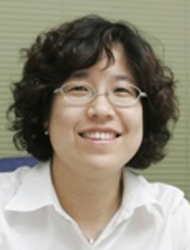 Seung-won Hwang
Seung-won Hwang
延世大学计算机科学系教授
Bio
Prof. Seung-won Hwang is a Professor of Computer Science at Yonsei University. Prior to joining Yonsei, she had been an Associate Professor at POSTECH for 10 years, after her PhD from UIUC. Her recent research interest has been data and language understanding and intelligence, led to 100+ publication at top-tier AI, DB/DM, and NLP venues, including ACL, AAAI, IJCAI, NAACL, SIGMOD, VLDB, and ICDE. She has received best paper runner-up and outstanding collaboration award from WSDM and Microsoft Research respectively.
 Butler Lampson
Butler Lampson
微软新英格兰研究院技术院士
1992年图灵奖获得者,英国皇家学会外籍院士,美国国家科学院(NAS)及美国国家工程院(NAE)院士
Bio
Butler Lampson is a Technical Fellow at Microsoft Corporation and an Adjunct Professor at MIT. He has worked on computer architecture, local area networks, raster printers, page description languages, operating systems, remote procedure call, programming languages and their semantics, programming in the large, fault-tolerant computing, transaction processing, computer security, WYSIWYG editors, and tablet computers. He was one of the designers of the SDS 940 time-sharing system, the Alto personal distributed computing system, the Xerox 9700 laser printer, two-phase commit protocols, the Autonet LAN, the SPKI system for network security, the Microsoft Tablet PC software, the Microsoft Palladium high-assurance stack, and several programming languages. He received the ACM Software Systems Award in 1984 for his work on the Alto, the IEEE Computer Pioneer award in 1996 and von Neumann Medal in 2001, the Turing Award in 1992, and the NAE’s Draper Prize in 2004. He is a member of the US National Academies of Sciences and of Engineering, and a Foreign Member of the Royal Society.
日程
11月6日
| 时间 | 环节 | 演讲嘉宾 |
|---|---|---|
| 09:20-09:30 | 开场致词 | 洪小文 |
| 9:30-09:45 | 主题演讲 | 萨提亚·纳德拉 |
| 9:45-10:15 | 主题演讲 | 沈向洋 |
| 10:15-11:00 | AI: Background, History and Future Opportunities | Raj Reddy |
| 11:00-11:45 | Automating Customizable Computing —Democratizing Accelerator Designs at the Edge and in the Cloud | Jason Cong |
| 11:45-12:00 | 微软学者奖学金颁奖典礼 | |
| 12:00-12:30 | 现场问答 | |
| 12:30-13:30 | 午餐 | |
| 13:30-17:00 | Microsoft Research Lab Director Forum | 论坛主席:
Eric Horvitz, Microsoft Research Labs & AI 演讲: Microsoft Research 360
论坛: How to do high impact research in industrial labs?
|
| Data and Knowledge | 论坛主席:
张冬梅, Microsoft Research Asia 嘉宾:
|
|
| Systems and Networking | 论坛主席:
周礼栋, Microsoft Research Asia 嘉宾:
|
|
| 18:00-20:00 | Asia Faculty Summit Banquet |
11月7日
| 时间 | 环节 | 演讲嘉宾 |
|---|---|---|
| 9:00-9:45 | Panel - The Journey of Talent Fostering in Computer Science |
|
| 9:45-10:30 | The Advent of Quantum Computing | 姚期智 |
| 10:30-11:15 | Towards a Conscious AI: A Computer Architecture Inspired by Cognitive Neuroscience | Lenore Blum |
| 11:15-12:00 | Challenges for Deep Learning towards Human-Level AI | Yoshua Bengio |
| 12:00-12:30 | 现场问题 | |
| 12:30-13:30 | 午餐 | |
| 13:30-17:00 | Visual Computing | 论坛主席: 曾文军, Microsoft Research Asia
嘉宾:
|
| Machine Learning | 论坛主席:
刘铁岩, Microsoft Research Asia 演讲: Recent development of machine learning
论坛: The future of machine learning
|
|
| AI in Practice *Language: Chinese with simultaneous interpreting |
论坛主席: 周明, Microsoft Research Asia
演讲: What are the new progress of AI research and technology?
论坛: how does AI empower products?
|
论坛嘉宾
Christopher Bishop, Microsoft Research Cambridge
 Christopher Bishop is a Microsoft Technical Fellow and Director of the Microsoft Research Lab in Cambridge, UK.
Christopher Bishop is a Microsoft Technical Fellow and Director of the Microsoft Research Lab in Cambridge, UK.
He is also Professor of Computer Science at the University of Edinburgh, and a Fellow of Darwin College, Cambridge. In 2004, he was elected Fellow of the Royal Academy of Engineering, in 2007 he was elected Fellow of the Royal Society of Edinburgh, and in 2017 he was elected Fellow of the Royal Society.
At Microsoft Research, Chris oversees a world-leading portfolio of industrial research and development, with a strong focus on machine learning and AI, and creating breakthrough technologies in cloud infrastructure, security, workplace productivity, computational biology, and healthcare.
Chris obtained a BA in Physics from Oxford, and a PhD in Theoretical Physics from the University of Edinburgh, with a thesis on quantum field theory. From there, he developed an interest in pattern recognition, and became Head of the Applied Neurocomputing Centre at AEA Technology. He was subsequently elected to a Chair in the Department of Computer Science and Applied Mathematics at Aston University, where he set up and led the Neural Computing Research Group.
Chris is the author of two highly cited and widely adopted machine learning text books: Neural Networks for Pattern Recognition (1995) and Pattern Recognition and Machine Learning (2006). He has also worked on a broad range of applications of machine learning in domains ranging from computer vision to healthcare. Chris is a keen advocate of public engagement in science, and in 2008 he delivered the prestigious Royal Institution Christmas Lectures, established in 1825 by Michael Faraday, and broadcast on national television.
Jennifer Chayes, Microsoft Research New England, NYC, and Montreal
 Jennifer Chayes is Technical Fellow and Managing Director of Microsoft Research New England, New York City, and Montreal. She was for many years Professor of Mathematics at UCLA. She is author of over 140 academic papers and inventor of over 30 patents. Her research areas include phase transitions in computer science, structural and dynamical properties of networks, graph theory, graph algorithms, and computational biology. She is one of the inventors of the field of graphons, which are now widely used in the machine learning of massive networks. Chayes’ recent work focuses on machine learning, broadly defined.
Jennifer Chayes is Technical Fellow and Managing Director of Microsoft Research New England, New York City, and Montreal. She was for many years Professor of Mathematics at UCLA. She is author of over 140 academic papers and inventor of over 30 patents. Her research areas include phase transitions in computer science, structural and dynamical properties of networks, graph theory, graph algorithms, and computational biology. She is one of the inventors of the field of graphons, which are now widely used in the machine learning of massive networks. Chayes’ recent work focuses on machine learning, broadly defined.
Chayes holds a BA in physics and biology from Wesleyan, where she graduated first in her class, and a PhD in physics from Princeton. She was a postdoctoral fellow at Harvard and Cornell. She is the recipient of the NSF Postdoc Fellowship, the Sloan Fellowship, the UCLA Distinguished Teaching Award, and the Anita Borg Institute Women of Leadership Vision Award. She has twice been a member of the Institute for Advanced Study in Princeton. Chayes is Fellow of the American Association for the Advancement of Science, the Fields Institute, the Association for Computing Machinery, and the American Mathematical Society, and the American Academy of Arts and Sciences. She is the winner of the 2015 John von Neumann Lecture Award, the highest honor of the Society of Industrial and Applied Mathematics. In 2016, she received an Honorary Doctorate from Leiden University.
Chayes serves on numerous scientific boards and committees. She is a past VP of the American Mathematical Society, past Chair of Mathematics for the Association for the Advancement of Science, and past Chair of the Turing Award Selection Committee. She is also committed to diversity in the science and technology, and serves on many boards to increase representation of women and minorities in STEM.
Changwen Chen, The Chinese University of Hong Kong, Shenzhen

Chang Wen Chen is currently Dean of School of Science and Engineering at the Chinese University of Hong Kong, Shenzhen. He is also an Empire Innovation Professor of Computer Science and Engineering at the University at Buffalo, State University of New York since 2008. He was Allen Henry Endow Chair Professor at the Florida Institute of Technology from July 2003 to December 2007. He was on the faculty of Electrical and Computer Engineering at the University of Rochester from 1992 to 1996 and on the faculty of Electrical and Computer Engineering at the University of Missouri-Columbia from 1996 to 2003.
He has been the Editor-in-Chief for IEEE Trans. Multimedia from January 2014 to December 2016. He has also served as the Editor-in-Chief for IEEE Trans. Circuits and Systems for Video Technology from January 2006 to December 2009. He has been an Editor for several other major IEEE Transactions and Journals, including the Proceedings of IEEE, IEEE Journal of Selected Areas in Communications, and IEEE Journal of Emerging and Selected Topics in Circuits and Systems. He has served as Conference Chair for several major IEEE, ACM and SPIE conferences related to multimedia video communications and signal processing. His research is supported by NSF, DARPA, Air Force, NASA, Whitaker Foundation, Microsoft, Intel, Kodak, Huawei, and Technicolor.
He received his BS from University of Science and Technology of China in 1983, MSEE from University of Southern California in 1986, and Ph.D. from University of Illinois at Urbana-Champaign in 1992. He and his students have received nine (9) Best Paper Awards or Best Student Paper Awards over the past two decades. He has also received several research and professional achievement awards, including the Sigma Xi Excellence in Graduate Research Mentoring Award in 2003, Alexander von Humboldt Research Award in 2009, the University at Buffalo Exceptional Scholar – Sustained Achievement Award in 2012, and the State University of New York System Chancellor’s Award for Excellence in Scholarship and Creative Activities in 2016. He is an IEEE Fellow since 2004 and an SPIE Fellow since 2007.
Lei Chen, Hong Kong University of Science and Technology
 Lei Chen has BS degree in computer science and engineering from Tianjin University, Tianjin, China, MA degree from Asian Institute of Technology, Bangkok, Thailand, and PhD in computer science from the University of Waterloo, Canada. He is a professor in the Department of Computer Science and Engineering, Hong Kong University of Science and Technology (HKUST). He is acting director of Big Data Institute at HKUST and Director of HKUST MOE/MSRA Information Technology Key Laboratory. His research includes human-powered machine learning, crowdsourcing, blockchain, social media analysis, probabilistic and uncertain databases, and privacy-preserved data publishing. The system developed by his team won the excellent demonstration award in VLDB 2014. Currently, he serves as Editor-in-Chief of VLDB Journal and an associate editor-in-chief of IEEE Transaction on Data and Knowledge Engineering.
Lei Chen has BS degree in computer science and engineering from Tianjin University, Tianjin, China, MA degree from Asian Institute of Technology, Bangkok, Thailand, and PhD in computer science from the University of Waterloo, Canada. He is a professor in the Department of Computer Science and Engineering, Hong Kong University of Science and Technology (HKUST). He is acting director of Big Data Institute at HKUST and Director of HKUST MOE/MSRA Information Technology Key Laboratory. His research includes human-powered machine learning, crowdsourcing, blockchain, social media analysis, probabilistic and uncertain databases, and privacy-preserved data publishing. The system developed by his team won the excellent demonstration award in VLDB 2014. Currently, he serves as Editor-in-Chief of VLDB Journal and an associate editor-in-chief of IEEE Transaction on Data and Knowledge Engineering.
Xilin Chen, Chinese Academy of Sciences
 Dr. Xilin Chen is a professor in the Institute of Computing Technology, Chinese Academy of Sciences (CAS), Beijing. He is a Fellow of IEEE, a Fellow of IAPR and a Fellow of China Computer Federation (CCF). Dr. Xilin Chen is an associate editor of IEEE Transactions on Multimedia, and Journal of Visual Communication and Image Representation, a leading editor of Journal of Computer Science of Technology, an associate editor in chief of the Chinese Journal of Computer, and an associate editor in chief of the Chinese Journal of Pattern Recognition and Artificial Intelligence. Dr. Xilin Chen’s research interests include Computer Vision, Pattern Recognition, Image Processing, Multimodal Interface. He is a recipient of one China's State Natural Science Award and four China's State Scientific and Technological Progress Awards. He co-authored more than 200 papers.
Dr. Xilin Chen is a professor in the Institute of Computing Technology, Chinese Academy of Sciences (CAS), Beijing. He is a Fellow of IEEE, a Fellow of IAPR and a Fellow of China Computer Federation (CCF). Dr. Xilin Chen is an associate editor of IEEE Transactions on Multimedia, and Journal of Visual Communication and Image Representation, a leading editor of Journal of Computer Science of Technology, an associate editor in chief of the Chinese Journal of Computer, and an associate editor in chief of the Chinese Journal of Pattern Recognition and Artificial Intelligence. Dr. Xilin Chen’s research interests include Computer Vision, Pattern Recognition, Image Processing, Multimodal Interface. He is a recipient of one China's State Natural Science Award and four China's State Scientific and Technological Progress Awards. He co-authored more than 200 papers.
Xuejin Chen, University of Science and Technology of China
 Xuejin Chen is an associate professor at the School of Information Science, University of Science and Technology of China. She received her B.S. (2003) and her Ph.D. (2008) from University of Science and Technology of China. From 2008 to 2010, she conducted her research as a postdoctoral scholar in Department of Computer Science at Yale University. She joined University of Science and Technology of China in Aug. 2010. From Feb. 2017 to Aug. 2017, she worked in Department of Computer Science, Stanford University as a visiting associate professor. Her research interests include 3D modeling, geometric processing and scene understanding. She has published more than 20 papers on top journals and conferences including ACM ToG, IEEE TVCG, CVPR, Eurographics.
Xuejin Chen is an associate professor at the School of Information Science, University of Science and Technology of China. She received her B.S. (2003) and her Ph.D. (2008) from University of Science and Technology of China. From 2008 to 2010, she conducted her research as a postdoctoral scholar in Department of Computer Science at Yale University. She joined University of Science and Technology of China in Aug. 2010. From Feb. 2017 to Aug. 2017, she worked in Department of Computer Science, Stanford University as a visiting associate professor. Her research interests include 3D modeling, geometric processing and scene understanding. She has published more than 20 papers on top journals and conferences including ACM ToG, IEEE TVCG, CVPR, Eurographics.
Jaegul Choo, Korea University
 Jaegul Choo (https://sites.google.com/site/jaegulchoo/ ) is an assistant professor in the Dept. of Computer Science and Engineering at Korea University. He has been a research scientist at Georgia Tech from 2011 to 2015, where he also received M.S in 2009 and Ph.D in 2013. His research covers broad areas including data mining, machine learning, visual analytics, computer vision, and natural language processing, and his work has been published in premier venues such as KDD, WWW, WSDM, CVPR, ECCV, EMNLP, AAAI, IJCAI, ICDM, ICWSM, SDM, TKDD, DMKD, KAIS, IEEE VIS, EuroVIS, CHI, TVCG, CFG, and CG&A. He earned the Best Student Paper Award at ICDM in 2016, the NAVER Young Faculty Award in 2015, the Outstanding Research Scientist Award at Georgia Tech in 2015, and the Best Poster Award at IEEE VAST (as part of IEEE VIS) in 2014.
Jaegul Choo (https://sites.google.com/site/jaegulchoo/ ) is an assistant professor in the Dept. of Computer Science and Engineering at Korea University. He has been a research scientist at Georgia Tech from 2011 to 2015, where he also received M.S in 2009 and Ph.D in 2013. His research covers broad areas including data mining, machine learning, visual analytics, computer vision, and natural language processing, and his work has been published in premier venues such as KDD, WWW, WSDM, CVPR, ECCV, EMNLP, AAAI, IJCAI, ICDM, ICWSM, SDM, TKDD, DMKD, KAIS, IEEE VIS, EuroVIS, CHI, TVCG, CFG, and CG&A. He earned the Best Student Paper Award at ICDM in 2016, the NAVER Young Faculty Award in 2015, the Outstanding Research Scientist Award at Georgia Tech in 2015, and the Best Poster Award at IEEE VAST (as part of IEEE VIS) in 2014.
Byung-Gon Chun , Seoul National University
 Byung-Gon Chun is an Associate Professor in the Computer Science and Engineering Department at Seoul National University (SNU). Chun was a visiting AI infrastructure Research Scientist at Facebook in 2016-2017. Before joining SNU, Chun was a Principal Scientist at Microsoft. Prior to that, Chun worked at Yahoo! Research, Intel Research, and International Computer Science Institute. Chun holds a Ph.D. in Computer Science from the University of California, Berkeley, an M.S. in Computer Science from Stanford University, and a B.S. and an M.S. from the Electronic Engineering Department at SNU. His research interests lie in systems for machine learning and data processing. He has published papers in the premier conferences such as SOSP, OSDI, SIGMOD, VLDB, NSDI, SIGCOMM, EuroSys, ATC, FAST, NIPS, and MobiSys. At SNU, he leads the development of fast and user-friendly deep learning frameworks and the development of Apache Nemo, a new flexible data processing system. He is a vice president of Apache REEF, a reusable big data processing library that supports both .NET and Java. He received the SOSP Best Paper Award (2009), and his work on smartphone security (TaintDroid) appeared in the “Research Highlights” section of Communications of the ACM in 2014. He is the recipient of the 2018 Amazon Machine Learning Research Award, the 2017 Facebook Caffe2 Research Award, the 2017 Amazon Cloud Credits for Research Award, the 2015 Naver Young Faculty Award, and the 2014 Microsoft Research Faculty Fellowship.
Byung-Gon Chun is an Associate Professor in the Computer Science and Engineering Department at Seoul National University (SNU). Chun was a visiting AI infrastructure Research Scientist at Facebook in 2016-2017. Before joining SNU, Chun was a Principal Scientist at Microsoft. Prior to that, Chun worked at Yahoo! Research, Intel Research, and International Computer Science Institute. Chun holds a Ph.D. in Computer Science from the University of California, Berkeley, an M.S. in Computer Science from Stanford University, and a B.S. and an M.S. from the Electronic Engineering Department at SNU. His research interests lie in systems for machine learning and data processing. He has published papers in the premier conferences such as SOSP, OSDI, SIGMOD, VLDB, NSDI, SIGCOMM, EuroSys, ATC, FAST, NIPS, and MobiSys. At SNU, he leads the development of fast and user-friendly deep learning frameworks and the development of Apache Nemo, a new flexible data processing system. He is a vice president of Apache REEF, a reusable big data processing library that supports both .NET and Java. He received the SOSP Best Paper Award (2009), and his work on smartphone security (TaintDroid) appeared in the “Research Highlights” section of Communications of the ACM in 2014. He is the recipient of the 2018 Amazon Machine Learning Research Award, the 2017 Facebook Caffe2 Research Award, the 2017 Amazon Cloud Credits for Research Award, the 2015 Naver Young Faculty Award, and the 2014 Microsoft Research Faculty Fellowship.
Eric Horvitz, Microsoft Research Labs & AI
 Eric Horvitz is a technical fellow and director at Microsoft Research. He has made contributions in areas of machine learning, perception, natural language understanding, decision making, and human-AI collaboration. His efforts and collaborations have led to fielded systems in healthcare, transportation, ecommerce, operating systems, and aerospace. He received the Feigenbaum Prize and the Allen Newell Prize for contributions to AI. He has been elected fellow of the National Academy of Engineering (NAE), the Association of Computing Machinery (ACM) , Association for the Advancement of AI (AAAI), and the American Academy of Arts and Sciences. He has served as president of the AAAI, and on advisory committees for the National Science Foundation, National Institutes of Health, President’s Council of Advisors on Science and Technology, DARPA, and the Allen Institute for AI. Beyond technical work, he has pursued efforts and studies on the influences of AI on people and society, including issues around ethics, law, and safety. He established the One Hundred Year Study on AI and served as a founder and co-chair of the Partnership on AI to Support People and Society. Eric received PhD and MD degrees at Stanford University. More information can be found on his home page. A list of publications can be found here.
Eric Horvitz is a technical fellow and director at Microsoft Research. He has made contributions in areas of machine learning, perception, natural language understanding, decision making, and human-AI collaboration. His efforts and collaborations have led to fielded systems in healthcare, transportation, ecommerce, operating systems, and aerospace. He received the Feigenbaum Prize and the Allen Newell Prize for contributions to AI. He has been elected fellow of the National Academy of Engineering (NAE), the Association of Computing Machinery (ACM) , Association for the Advancement of AI (AAAI), and the American Academy of Arts and Sciences. He has served as president of the AAAI, and on advisory committees for the National Science Foundation, National Institutes of Health, President’s Council of Advisors on Science and Technology, DARPA, and the Allen Institute for AI. Beyond technical work, he has pursued efforts and studies on the influences of AI on people and society, including issues around ethics, law, and safety. He established the One Hundred Year Study on AI and served as a founder and co-chair of the Partnership on AI to Support People and Society. Eric received PhD and MD degrees at Stanford University. More information can be found on his home page. A list of publications can be found here.
Winston H. Hsu, National Taiwan University
 Prof. Winston Hsu is an active researcher dedicated to large-scale image/video retrieval/mining, visual recognition, and machine intelligence. He is keen to realizing advanced researches towards business deliverables via academia-industry collaborations and co-founding startups. He is a Professor in the Department of Computer Science and Information Engineering, National Taiwan University and co-leads Communication and Multimedia Lab (CMLab). Working closely with the industry, he was a Visiting Scientist at Microsoft Research Redmond (2014) and had his 1-year sabbatical leave (2016-2017) at IBM TJ Watson Research Center, New York, to enhance Watson’s visual cognition, where he contributed the first AI produced movie trailer. He is the Founding Director for NVIDIA AI Lab (NTU), the 1st in Asia. Having investigated deep neural networks for numerous image/video challenges, recently, he is also helping companies set up the AI/deep learning teams for advanced products. He received Ph.D. (2007) from Columbia University, New York. Before that, he was a founding engineer and research manager in CyberLink Corp. He serves as the Associate Editor for IEEE Transactions on Circuits and Systems for Video Technology (TCSVT) and IEEE Transactions on Multimedia, two premier journals, and was in the Editorial Board for IEEE Multimedia Magazine (2010 – 2017). He is also a columnist for Digitimes for the machine learning aspect.
Prof. Winston Hsu is an active researcher dedicated to large-scale image/video retrieval/mining, visual recognition, and machine intelligence. He is keen to realizing advanced researches towards business deliverables via academia-industry collaborations and co-founding startups. He is a Professor in the Department of Computer Science and Information Engineering, National Taiwan University and co-leads Communication and Multimedia Lab (CMLab). Working closely with the industry, he was a Visiting Scientist at Microsoft Research Redmond (2014) and had his 1-year sabbatical leave (2016-2017) at IBM TJ Watson Research Center, New York, to enhance Watson’s visual cognition, where he contributed the first AI produced movie trailer. He is the Founding Director for NVIDIA AI Lab (NTU), the 1st in Asia. Having investigated deep neural networks for numerous image/video challenges, recently, he is also helping companies set up the AI/deep learning teams for advanced products. He received Ph.D. (2007) from Columbia University, New York. Before that, he was a founding engineer and research manager in CyberLink Corp. He serves as the Associate Editor for IEEE Transactions on Circuits and Systems for Video Technology (TCSVT) and IEEE Transactions on Multimedia, two premier journals, and was in the Editorial Board for IEEE Multimedia Magazine (2010 – 2017). He is also a columnist for Digitimes for the machine learning aspect.
Seung-won Hwang, Yonsei University
 Prof. Seung-won Hwang is a Professor of Computer Science at Yonsei University. Prior to joining Yonsei, she had been an Associate Professor at POSTECH for 10 years, after her PhD from UIUC. Her recent research interest has been data and language understanding and intelligence, led to 100+ publication at top-tier AI, DB/DM, and NLP venues, including ACL, AAAI, IJCAI, NAACL, SIGMOD, VLDB, and ICDE. She has received best paper runner-up and outstanding collaboration award from WSDM and Microsoft Research respectively.
Prof. Seung-won Hwang is a Professor of Computer Science at Yonsei University. Prior to joining Yonsei, she had been an Associate Professor at POSTECH for 10 years, after her PhD from UIUC. Her recent research interest has been data and language understanding and intelligence, led to 100+ publication at top-tier AI, DB/DM, and NLP venues, including ACL, AAAI, IJCAI, NAACL, SIGMOD, VLDB, and ICDE. She has received best paper runner-up and outstanding collaboration award from WSDM and Microsoft Research respectively.
Donald Kossmann, Microsoft Research Redmond
 Donald Kossmann is the director of the Microsoft Research Lab in Redmond.He spent most of his career in academia. He was a professor in the Systems Group of the Department of Computer Science at ETH Zurich for 13 years, doing research and teaching all flavors of data management systems. He was chair of ACM SIGMOD from 2013 to 2017 and served on the Board of Trustees of the VLDB Endowment from 2005 to 2011. He is a co-founder of four companies: i-TV-T AG (1998), XQRL Inc. (2002), 28msec Inc. (2006), and Teralytics AG (2010).
Donald Kossmann is the director of the Microsoft Research Lab in Redmond.He spent most of his career in academia. He was a professor in the Systems Group of the Department of Computer Science at ETH Zurich for 13 years, doing research and teaching all flavors of data management systems. He was chair of ACM SIGMOD from 2013 to 2017 and served on the Board of Trustees of the VLDB Endowment from 2005 to 2011. He is a co-founder of four companies: i-TV-T AG (1998), XQRL Inc. (2002), 28msec Inc. (2006), and Teralytics AG (2010).
James Kwok, Hong Kong University of Science and Technology
 Prof. Kwok is a Professor in the Department of Computer Science and Engineering, Hong Kong University of Science and Technology. He received his B.Sc. degree in Electrical and Electronic Engineering from the University of Hong Kong and his Ph.D. degree in computer science from the Hong Kong University of Science and Technology. Prof. Kwok served/is serving as an Associate Editor for the IEEE Transactions on Neural Networks and Learning Systems, Neurocomputing and the International Journal of Data Science and Analytics. He has also served as Program Co-chair of a number of international conferences, and as Area Chairs in conferences such as NIPS, ICML, ECML, AAAI and IJCAI. He is an IEEE Fellow.
Prof. Kwok is a Professor in the Department of Computer Science and Engineering, Hong Kong University of Science and Technology. He received his B.Sc. degree in Electrical and Electronic Engineering from the University of Hong Kong and his Ph.D. degree in computer science from the Hong Kong University of Science and Technology. Prof. Kwok served/is serving as an Associate Editor for the IEEE Transactions on Neural Networks and Learning Systems, Neurocomputing and the International Journal of Data Science and Analytics. He has also served as Program Co-chair of a number of international conferences, and as Area Chairs in conferences such as NIPS, ICML, ECML, AAAI and IJCAI. He is an IEEE Fellow.
Kyoung Mu Lee, Seoul National University
 Kyoung Mu Lee received his Ph. D. degree from the University of Southern California in 1993. He is now with the Dept. of ECE at Seoul National University as a professor. His primary research interests include scene understanding, object recognition, low-level vision, visual tracking, and visual navigation. He is currently serving as an AEIC (Associate Editor in Chief) of the IEEE TPAMI, an Area Editor of the Computer Vision and Image Understanding (CVIU), and has served as an Associate Editor of the IEEE TPAMI, the Machine Vision Application (MVA) Journal and the IPSJ Transactions on Computer Vision and Applications (CVA), and the IEEE Signal Processing Letter. He is an Advisory Board Member of CVF (Computer Vision Foundation) and an Editorial Advisory Board Member for Academic Press/Elsevier. He will serve as a general chair of ACM MM2018, ACCV2018, and ICCV2019. He was a Distinguished Lecturer of the Asia-Pacific Signal and Information Processing Association (APSIPA) for 2012-2013. More information can be found on his homepage http://cv.snu.ac.kr/kmlee.
Kyoung Mu Lee received his Ph. D. degree from the University of Southern California in 1993. He is now with the Dept. of ECE at Seoul National University as a professor. His primary research interests include scene understanding, object recognition, low-level vision, visual tracking, and visual navigation. He is currently serving as an AEIC (Associate Editor in Chief) of the IEEE TPAMI, an Area Editor of the Computer Vision and Image Understanding (CVIU), and has served as an Associate Editor of the IEEE TPAMI, the Machine Vision Application (MVA) Journal and the IPSJ Transactions on Computer Vision and Applications (CVA), and the IEEE Signal Processing Letter. He is an Advisory Board Member of CVF (Computer Vision Foundation) and an Editorial Advisory Board Member for Academic Press/Elsevier. He will serve as a general chair of ACM MM2018, ACCV2018, and ICCV2019. He was a Distinguished Lecturer of the Asia-Pacific Signal and Information Processing Association (APSIPA) for 2012-2013. More information can be found on his homepage http://cv.snu.ac.kr/kmlee.
Seong-Whan Lee, Korea University
 Seong-Whan Lee is the Hyundai Motor chair professor of the Department of Brain and Cognitive Engineering, Korea University. He received the B.S. degree in computer science and statistics from Seoul National University, Seoul, Korea, in 1984, and the M.S. and Ph.D. degrees in computer science from Korea Advanced Institute of Science and Technology in 1986 and 1989, respectively.From February 1989 to February 1995, he was an Assistant Professor in the Department of Computer Science at Chungbuk National University, Cheongju, Korea. In March 1995, he joined the faculty of the Department of Computer Science and Engineering at Korea University, Seoul, Korea, and now he is the tenured full professor. In 2001, he stayed at the Department of Brain and Cognitive Sciences, MIT as a visiting professor.A Fellow of the IEEE, IAPR, and Korean Academy of Science and Technology, he has served several professional societies as chairman or governing board member. He was the founding Co-Editor-in-Chief of the International Journal of Document Analysis and Recognition and has been an Associate Editor of several international journals: Pattern Recognition, ACM Trans. on Applied Perception, IEEE Trans. on Affective Computing, Image and Vision Computing, International Journal of Pattern Recognition and Artificial Intelligence, and International Journal of Image and Graphics. Currently, he is the president of Korean Association for Artificial Intelligence.His research interests include pattern recognition, machine learning, and brain engineering. He has more than 400 publications in international journals and conference proceedings, and authored 10 books.
Seong-Whan Lee is the Hyundai Motor chair professor of the Department of Brain and Cognitive Engineering, Korea University. He received the B.S. degree in computer science and statistics from Seoul National University, Seoul, Korea, in 1984, and the M.S. and Ph.D. degrees in computer science from Korea Advanced Institute of Science and Technology in 1986 and 1989, respectively.From February 1989 to February 1995, he was an Assistant Professor in the Department of Computer Science at Chungbuk National University, Cheongju, Korea. In March 1995, he joined the faculty of the Department of Computer Science and Engineering at Korea University, Seoul, Korea, and now he is the tenured full professor. In 2001, he stayed at the Department of Brain and Cognitive Sciences, MIT as a visiting professor.A Fellow of the IEEE, IAPR, and Korean Academy of Science and Technology, he has served several professional societies as chairman or governing board member. He was the founding Co-Editor-in-Chief of the International Journal of Document Analysis and Recognition and has been an Associate Editor of several international journals: Pattern Recognition, ACM Trans. on Applied Perception, IEEE Trans. on Affective Computing, Image and Vision Computing, International Journal of Pattern Recognition and Artificial Intelligence, and International Journal of Image and Graphics. Currently, he is the president of Korean Association for Artificial Intelligence.His research interests include pattern recognition, machine learning, and brain engineering. He has more than 400 publications in international journals and conference proceedings, and authored 10 books.
Seungyong Lee, POSTECH
 Seungyong Lee is a professor of computer science and engineering at Pohang University of Science and Technology (POSTECH), Korea. He received a PhD degree in computer science from Korea Advanced Institute of Science and Technology (KAIST) in 1995. From 1995 to 1996, he worked at City College of New York as a postdoctoral researcher. Since 1996, he has been a faculty member of POSTECH, where he leads Computer Graphics Group. During his sabbatical years, he worked at MPI Informatik (2003-2004) and Creative Technologies Lab at Adobe Systems (2010-2011). His technologies on image deblurring and photo upright adjustment have been transferred to Adobe Creative Cloud and Adobe Photoshop Lightroom. His current research interests include image and video processing, deep learning based computational photography, and 3D scene reconstruction.
Seungyong Lee is a professor of computer science and engineering at Pohang University of Science and Technology (POSTECH), Korea. He received a PhD degree in computer science from Korea Advanced Institute of Science and Technology (KAIST) in 1995. From 1995 to 1996, he worked at City College of New York as a postdoctoral researcher. Since 1996, he has been a faculty member of POSTECH, where he leads Computer Graphics Group. During his sabbatical years, he worked at MPI Informatik (2003-2004) and Creative Technologies Lab at Adobe Systems (2010-2011). His technologies on image deblurring and photo upright adjustment have been transferred to Adobe Creative Cloud and Adobe Photoshop Lightroom. His current research interests include image and video processing, deep learning based computational photography, and 3D scene reconstruction.
Jian Li, Tsinghua University
 Jian Li is currently an associate professor at Institute for Interdisciplinary Information Sciences (IIIS, previously ITCS), Tsinghua University, headed by Prof. Andrew Yao. He got his BSc degree from Sun Yat-sen (Zhongshan) University, China, MSc degree in computer science from Fudan University, China and PhD degree in the University of Maryland, USA. His major research interests lie in the broad area of theoretical computer science, the algorithmic and theoretical aspects of machine learning, databases and computational finance. He co-authored several research papers that have been published in major computer science conferences and journals. He received the best paper awards at VLDB 2009 and ESA 2010. He is also a recipient of the "221 Basic Research Plan for Young Faculties" at Tsinghua University and the "new century excellent talents award" by Ministry of Education of China.
Jian Li is currently an associate professor at Institute for Interdisciplinary Information Sciences (IIIS, previously ITCS), Tsinghua University, headed by Prof. Andrew Yao. He got his BSc degree from Sun Yat-sen (Zhongshan) University, China, MSc degree in computer science from Fudan University, China and PhD degree in the University of Maryland, USA. His major research interests lie in the broad area of theoretical computer science, the algorithmic and theoretical aspects of machine learning, databases and computational finance. He co-authored several research papers that have been published in major computer science conferences and journals. He received the best paper awards at VLDB 2009 and ESA 2010. He is also a recipient of the "221 Basic Research Plan for Young Faculties" at Tsinghua University and the "new century excellent talents award" by Ministry of Education of China.
Shipeng Li, IFLY
 Dr. Shipeng Li is Corporate Vice President and Co-President of Research, iFLYTEK Co. Ltd. since May 2018. From Nov 2015 - April 2018, he was CTO of Cogobuy Group and IngDan Technology, a platform dedicated to technology transfer in IoT & AI areas. In 2016, he founded IngDan Labs pioneering in IoT & AI innovations. He was a founding member of Microsoft Research Asia (MSRA) which was named as the “hottest computer lab” in the world by MIT Technology Review. Dr. Li was once a Research Area Manager and Principal Researcher at MSRA, and a Microsoft Partner in 1999-2015. In 1996-1999, Dr. Li was with Sarnoff Corporation as Member of Technical Staff.
Dr. Shipeng Li is Corporate Vice President and Co-President of Research, iFLYTEK Co. Ltd. since May 2018. From Nov 2015 - April 2018, he was CTO of Cogobuy Group and IngDan Technology, a platform dedicated to technology transfer in IoT & AI areas. In 2016, he founded IngDan Labs pioneering in IoT & AI innovations. He was a founding member of Microsoft Research Asia (MSRA) which was named as the “hottest computer lab” in the world by MIT Technology Review. Dr. Li was once a Research Area Manager and Principal Researcher at MSRA, and a Microsoft Partner in 1999-2015. In 1996-1999, Dr. Li was with Sarnoff Corporation as Member of Technical Staff.
Dr. Li is the Editor-in-Chief of IEEE Transactions on Circuits and Systems for Video Technology and a Fellow of IEEE. He is an influential expert on multimedia, internet, computer vision, cloud computing, IoT and artificial intelligence, holding 196 US patents and 330+ international technical publications with 18,800+ citations (H-index: 70). Dr. Li is the Secretary General of Alumni Association of Microsoft Research Asia (regarded as the “Whampoa Military Academy” of AI in China). He serves as Joint Secretary General of Artificial Intelligence Industry Technology Innovation Strategic Alliance under China MOST since 2017. He has trained 4 MIT TR35 winners (the world's top 35 innovators under the age of 35) over the years.
Dr. Li received B.S. (1988) and M.S. (1991) from University of Science and Technology of China and Ph.D.(1996) from Lehigh University.
Shixia Liu, Tsinghua University
 Shixia Liu is a tenured associate professor at Tsinghua University. Her research interests include visual text analytics, visual social analytics, visual behavior analytics, graph visualization, and tree visualization. Before joining Tsinghua University, she worked as a lead researcher at Microsoft Research Asia and a research staff member at IBM China Research Lab. Shixia is one of the Papers Co-Chairs of IEEE VAST 2016 and 2017. She is an associate of IEEE Transactions on Visualization and Computer Graphics and IEEE Transactions on Big data. She is on the editorial board of Information Visualization and Journal of visualization. She was the guest editor of ACM Transactions on Intelligent Systems and Technology and Tsinghua Science and Technology. She was the program co-chair of PacifcVis 2014 and VINCI 2012. Shixia was in the Steering Committee of VINCI 2013. She is on the organizing committee of IEEE VIS 2015 and 2014. She is/was in the Program Committee for CHI 2019, 2018, InfoVis 2015, 2014, VAST 2018, 2015, 2014, KDD 2015, 2014, 2013, ACM Multimedia 2009, SDM 2008, ACM IUI 2011, 2009, PacificVis 2008, 2009, 2010, 2011, PAKDD 2013, VISAPP 2012, 2011, VINCI 2011.
Shixia Liu is a tenured associate professor at Tsinghua University. Her research interests include visual text analytics, visual social analytics, visual behavior analytics, graph visualization, and tree visualization. Before joining Tsinghua University, she worked as a lead researcher at Microsoft Research Asia and a research staff member at IBM China Research Lab. Shixia is one of the Papers Co-Chairs of IEEE VAST 2016 and 2017. She is an associate of IEEE Transactions on Visualization and Computer Graphics and IEEE Transactions on Big data. She is on the editorial board of Information Visualization and Journal of visualization. She was the guest editor of ACM Transactions on Intelligent Systems and Technology and Tsinghua Science and Technology. She was the program co-chair of PacifcVis 2014 and VINCI 2012. Shixia was in the Steering Committee of VINCI 2013. She is on the organizing committee of IEEE VIS 2015 and 2014. She is/was in the Program Committee for CHI 2019, 2018, InfoVis 2015, 2014, VAST 2018, 2015, 2014, KDD 2015, 2014, 2013, ACM Multimedia 2009, SDM 2008, ACM IUI 2011, 2009, PacificVis 2008, 2009, 2010, 2011, PAKDD 2013, VISAPP 2012, 2011, VINCI 2011.
Ting Liu, Harbin Institute of Technology
 LIU Ting is a full-time professor of Harbin Institute of Technology (HIT), the member of national Ten-thousand Talents Program. He is the deputy director of AI Research Institute, HIT. He also holds the director position of Social Computing & Information Retrieval Research Centre of Computer Science School in the university. His research interests primarily focus on natural language processing and social computing. He is the principal investigator of "Language Technology Platform (LTP)", "BIGCilin" and other widely used applications in the industry. He holds the first prize of Heilongjiang Province S&T Progress Award.
LIU Ting is a full-time professor of Harbin Institute of Technology (HIT), the member of national Ten-thousand Talents Program. He is the deputy director of AI Research Institute, HIT. He also holds the director position of Social Computing & Information Retrieval Research Centre of Computer Science School in the university. His research interests primarily focus on natural language processing and social computing. He is the principal investigator of "Language Technology Platform (LTP)", "BIGCilin" and other widely used applications in the industry. He holds the first prize of Heilongjiang Province S&T Progress Award.
Weiying Ma, ByteDance (Jinritoutiao)
 Wei-Ying Ma is a Vice President and the Head of AI Lab at ByteDance. He is responsible for fundamental research and technology development in areas including machine learning, computer vision, speech and audio processing, natural language processing, personalized recommendation and search. The technologies from his teams have been used by hundreds of millions of users daily through ByteDance's content platforms and core products such as Jinri Toutiao and Douyin. Prior to ByteDance, Wei-Ying Ma was an Assistant Managing Director at Microsoft Research Asia. He developed many technologies that were successfully transferred to Microsoft’s Bing, Ads Center, Cognitive Services, Exchange, SharePoint, Azure, and Xiaoice. He has contributed to many open-sourced technologies at GitHub, including the Distributed Machine Learning Toolkit, Microsoft Graph Engine and Microsoft Concept Graph.
Wei-Ying Ma is a Vice President and the Head of AI Lab at ByteDance. He is responsible for fundamental research and technology development in areas including machine learning, computer vision, speech and audio processing, natural language processing, personalized recommendation and search. The technologies from his teams have been used by hundreds of millions of users daily through ByteDance's content platforms and core products such as Jinri Toutiao and Douyin. Prior to ByteDance, Wei-Ying Ma was an Assistant Managing Director at Microsoft Research Asia. He developed many technologies that were successfully transferred to Microsoft’s Bing, Ads Center, Cognitive Services, Exchange, SharePoint, Azure, and Xiaoice. He has contributed to many open-sourced technologies at GitHub, including the Distributed Machine Learning Toolkit, Microsoft Graph Engine and Microsoft Concept Graph.
Wei-Ying Ma has published more than 300 papers at international conferences and in journals. He has been granted with more than 160 patents. He is a Fellow of the IEEE. He has served as program co-chair of the International Conference on World Wide Web (WWW) 2008 and the general co-chair of ACM Special Interest Group on Information Retrieval (SIGIR) 2011. He has served on many editorial boards including ACM Transactions on Information System (TOIS), the ACM/Springer Multimedia Systems Journal, and the Journal of Multimedia Tools and Applications. He was a member of International World Wide Web Conferences Steering Committee from 2010 to 2016. He was awarded a Distinguished Alumni from the EECS of National Tsing Hua University in 2010. He received the honor to deliver a Distinguished Lecture at University of California at Santa Barbara ECE 50th Anniversary in 2013.
Sinno Jialin Pan, Nanyang Technological University
 Sinno Jialin Pan is a Nanyang Assistant Professor at the School of Computer Science and Engineering at Nanyang Technological University (NTU), Singapore. Prior to joining NTU, he was a scientist and Lab Head of text analytics with the Data Analytics Department, Institute for Infocomm Research, Singapore. He received his Ph.D. degree in computer science from the Hong Kong University of Science and Technology (HKUST) in 2011. His research interests include transfer learning, and its applications to wireless-sensor-based data mining, text mining, sentiment analysis, and software engineering.
Sinno Jialin Pan is a Nanyang Assistant Professor at the School of Computer Science and Engineering at Nanyang Technological University (NTU), Singapore. Prior to joining NTU, he was a scientist and Lab Head of text analytics with the Data Analytics Department, Institute for Infocomm Research, Singapore. He received his Ph.D. degree in computer science from the Hong Kong University of Science and Technology (HKUST) in 2011. His research interests include transfer learning, and its applications to wireless-sensor-based data mining, text mining, sentiment analysis, and software engineering.
Long Quan, The Hong Kong University of Science and Technology
 Long Quan received the Ph.D. in Computer Science at INRIA, France, in 1989. Before joining the Department of Computer Science at the Hong Kong University of Science and Technology (HKUST) in 2001 to found his computer vision group, he has been one of the founding members of INRIA Grenoble Computer Vision Group since 1990.
Long Quan received the Ph.D. in Computer Science at INRIA, France, in 1989. Before joining the Department of Computer Science at the Hong Kong University of Science and Technology (HKUST) in 2001 to found his computer vision group, he has been one of the founding members of INRIA Grenoble Computer Vision Group since 1990.
He directed the founding best French PhD thesis in computer science by Peter Sturm, le prix de these Gilles Kahn in 1998, the Piero Zamperoni Best Student Paper Award in 2000 by Maxime Lhuillier, the first of six highlights of Siggraph 2007, the Best Student Poster Paper of CVPR 2008. His many graduate students are now world computer vision leaders at INRIA and CNRS in France, Microsoft, Google, and Princeton in USA, and Alibaba, Tencent, DJI, and Beijing University in China.
He has served in all the major computer vision journals, as an Associate Editor of IEEE Transactions on Pattern Analysis and Machine Intelligence (PAMI), a Regional Editor of Image and Vision Computing Journal (IVC), an editorial board member of the International Journal of Computer Vision (IJCV), an editorial board member of the Electronic Letters on Computer Vision and Image Analysis (ELCVIA), an associate editor of Machine Vision and Applications (MVA), and an editorial member of Foundations and Trends in Computer Graphics and Vision.
He has contributed to all the major computer vision conferences, IEEE International Conference on Computer Vision (ICCV), European Conference on Computer Vision (ECCV), and IEEE Computer Vision and Pattern Recognition (CVPR), and IAPR International Conference on Pattern Recognition (ICPR). He served as a Program Chair of ICPR 2006 Computer Vision and Image Analysis, a Program Chair of ICPR 2012 Computer and Robot Vision, a General Chair of the ICCV 2011 in Barcelona, and a General Chair of the IEEE CVPR 2022 in New Orleans. He is the founding director of the HKUST Center for Visual Computing and Image Science. He is also an IEEE Fellow of the Computer Society.
Most recently, with his HKUST graduates, he founded altizure.com, the world's first portal for generating 3D from photos!
Yoichi Sato, The University of Tokyo
 Yoichi Sato is a professor at Institute of Industrial Science, the University of Tokyo. He received his B.S. degree from the University of Tokyo in 1990, and his MS and PhD degrees in robotics from School of Computer Science, Carnegie Mellon University in 1993 and 1997. His research interests include gaze sensing and analysis, first-person vision, physics-based vision, and reflectance analysis. He served/is serving in several conference organization and journal editorial roles including IEEE Transactions on Pattern Analysis and Machine Intelligence, International Journal of Computer Vision, Computer Vision and Image Understanding, ICCV 2021 Program Co-Chair, ACCV 2018 General Co-Chair, ACCV 2016 Program Co-Chair, and ECCV 2012 Program Co-Chair.
Yoichi Sato is a professor at Institute of Industrial Science, the University of Tokyo. He received his B.S. degree from the University of Tokyo in 1990, and his MS and PhD degrees in robotics from School of Computer Science, Carnegie Mellon University in 1993 and 1997. His research interests include gaze sensing and analysis, first-person vision, physics-based vision, and reflectance analysis. He served/is serving in several conference organization and journal editorial roles including IEEE Transactions on Pattern Analysis and Machine Intelligence, International Journal of Computer Vision, Computer Vision and Image Understanding, ICCV 2021 Program Co-Chair, ACCV 2018 General Co-Chair, ACCV 2016 Program Co-Chair, and ECCV 2012 Program Co-Chair.
Jian Sun, Face++
 Jian Sun was born in Xian, China, which is home of The Terracotta Army. He received a B.S., M.S., and a Ph.D. degree from Xian Jiaotong University in 1997, 2000 and 2003, respectively. Immediately following, he joined Microsoft Research Asia, and has been working in the fields of computer vision and computer graphics, with particular interests in solving fundamental research problems and building real-world working systems. After thirteen amazing years at Microsoft Research, he has joined Face++ (Megvii Technology) (in July, 2016) as Chief Scientist and Managing Director of Research. His primary research interests are computational photography, face recognition, and deep learning based image understanding.
Jian Sun was born in Xian, China, which is home of The Terracotta Army. He received a B.S., M.S., and a Ph.D. degree from Xian Jiaotong University in 1997, 2000 and 2003, respectively. Immediately following, he joined Microsoft Research Asia, and has been working in the fields of computer vision and computer graphics, with particular interests in solving fundamental research problems and building real-world working systems. After thirteen amazing years at Microsoft Research, he has joined Face++ (Megvii Technology) (in July, 2016) as Chief Scientist and Managing Director of Research. His primary research interests are computational photography, face recognition, and deep learning based image understanding.
Min Sun, National Tsing Hua University
 Dr. Min Sun is Chief Artificial Intelligence (AI) Scientist of Appier. He joined Appier from National Tsing Hua University (NTHU), where he served as an Associate Professor in the Department of Electrical Engineering.
Dr. Min Sun is Chief Artificial Intelligence (AI) Scientist of Appier. He joined Appier from National Tsing Hua University (NTHU), where he served as an Associate Professor in the Department of Electrical Engineering.
Dr. Sun has worked under some of the most influential AI leaders, including Andrew Ng, Fei-Fei Li and Silvio Savarese. He contributed crowdsourcing ideas to the revolutionary ImageNet project led by Fei-Fei Li in 2009, and he is also an early contributor to the Robot Operating System (ROS) and Microsoft Kinect’s human pose estimation system.
Dr. Sun was on the team led by Fei-Fei Li, working on the revolutionary ImageNet project in 2009. He also holds 2 U.S. patents. In 2017, he led a summer research project featuring creativity in AI with Appier, which was subsequently accepted by the prestigious AAAI 2018. In the past three years, he published 22 top AI conference papers from Taiwan.
His areas of expertise are computer vision, natural language processing, deep learning, and reinforcement learning, while his research interests include 3D object recognition, human pose estimation, scene understanding, video understanding, and text summarization. In 2016, Dr. Sun won the Digital Drift Best Paper on Deep Learning for Visual Analysis (1st and 2nd place). From 2015-2017, Dr. Sun has won CVGIP Best Paper Awards three times in a row. He is also the latest recipient of the Creative Young Scholar Award from the Foundation for the Advancement of Outstanding Scholarship in Taiwan. Before joining NTHU, he was a postdoctoral fellow in Computer Science & Engineering at the University ofWashington.
Dr. Sun received his Ph.D in Electrical Engineering: System from the University of Michigan and his M.S in Electrical Engineering from Stanford University.
Jie Tang, Tsinghua University
 Jie Tang is an associate professor in Department of Computer Science and Technology of Tsinghua University. He obtained his Ph.D. in DCST of Tsinghua University in 2006. He became ACM Professional member in 2006, IEEE member in 2007, and CCF Distinguished Member in 2015. His research interests include social network theories, data mining methodologies, machine learning algorithms, and semantic web technologies.
Jie Tang is an associate professor in Department of Computer Science and Technology of Tsinghua University. He obtained his Ph.D. in DCST of Tsinghua University in 2006. He became ACM Professional member in 2006, IEEE member in 2007, and CCF Distinguished Member in 2015. His research interests include social network theories, data mining methodologies, machine learning algorithms, and semantic web technologies.
He has been a visiting scholar at Cornell University (working with John Hopcroft), University of Illinois at Urbana-Champaign (short term, working with Jiawei Han), Chinese University of Hong Kong (working with Jeffrey Yu), and Hong Kong University of Science and Technology (working with Qiong Luo). During his graduate career, he has been an intern at NLC group of Microsoft Research Asia from 2004 to 2005. He also has attended the internship program of IBM China Research Lab in 2004.
Liwei Wang, Peking University
 Liwei Wang is a professor of School of Electronics Engineering and Computer Sciences, Peking University. His main research interest is machine learning theory and has published more than 100 papers on top conferences and journals. He was the first Asian researcher who was named among “AI’s 10 to Watch”. He served as the Area Chair of NIPS and Associate Editor of IEEE TPAMI.
Liwei Wang is a professor of School of Electronics Engineering and Computer Sciences, Peking University. His main research interest is machine learning theory and has published more than 100 papers on top conferences and journals. He was the first Asian researcher who was named among “AI’s 10 to Watch”. He served as the Area Chair of NIPS and Associate Editor of IEEE TPAMI.
Xinbing Wang, Shanghai Jiao Tong University
 Xinbing Wang received the B.S. degree (with hons.) in Automation from Shanghai Jiao Tong University, Shanghai, China, in 1998, the M.S. degree in computer science and technology from Tsinghua University, Beijing, China, in 2001, and the Ph.D. degree with a major in electrical and computer engineering and minor in mathematics from North Carolina State University, Raleigh, in 2006. Currently, he is a Professor in the Department of Electronic Engineering, and Department of Computer Science, Shanghai Jiao Tong University, Shanghai, China. Dr. Wang has been an Associate Editor for IEEE/ACM Transactions on Networking,IEEE Transactions on Mobile Computing, and ACM Transactions on Sensor Networks. He has also been the Technical Program Committees of several conferences including ACM MobiCom 2012,2014,2018, ACM MobiHoc 2012-2018, IEEE INFOCOM 2009-2018.
Xinbing Wang received the B.S. degree (with hons.) in Automation from Shanghai Jiao Tong University, Shanghai, China, in 1998, the M.S. degree in computer science and technology from Tsinghua University, Beijing, China, in 2001, and the Ph.D. degree with a major in electrical and computer engineering and minor in mathematics from North Carolina State University, Raleigh, in 2006. Currently, he is a Professor in the Department of Electronic Engineering, and Department of Computer Science, Shanghai Jiao Tong University, Shanghai, China. Dr. Wang has been an Associate Editor for IEEE/ACM Transactions on Networking,IEEE Transactions on Mobile Computing, and ACM Transactions on Sensor Networks. He has also been the Technical Program Committees of several conferences including ACM MobiCom 2012,2014,2018, ACM MobiHoc 2012-2018, IEEE INFOCOM 2009-2018.
Yizhou Wang, Peking University
 Dr. Yizhou Wang is a BoYa Professor of Computer Science Department and the vice director of the Center on Frontiers of Computing Studies at Peking University. He received his Bachelor’s degree in Electrical Engineering from Tsinghua University in 1996, and his Ph.D. in Computer Science from University of California at Los Angeles (UCLA) in 2005. He joined Xerox Palo Alto Research Center (Xerox PARC) as a research staff from 2005 to 2007. Dr. Wang’s research interests include computational vision, statistical modeling and learning, medical image analysis, and digital visual arts.
Dr. Yizhou Wang is a BoYa Professor of Computer Science Department and the vice director of the Center on Frontiers of Computing Studies at Peking University. He received his Bachelor’s degree in Electrical Engineering from Tsinghua University in 1996, and his Ph.D. in Computer Science from University of California at Los Angeles (UCLA) in 2005. He joined Xerox Palo Alto Research Center (Xerox PARC) as a research staff from 2005 to 2007. Dr. Wang’s research interests include computational vision, statistical modeling and learning, medical image analysis, and digital visual arts.
Furu Wei, Microsoft Research Asia
 Furu Wei is a Senior Research Manager at Natural Language Computing Group in Microsoft Research Asia. He has published over 100 conference and journal papers in research topics on natural language understanding and generation. Furu Wei was named to the 2017 MIT Technology Review’s annual list of Innovators Under 35 China (MIT TR35 China) for contributions to natural language processing.
Furu Wei is a Senior Research Manager at Natural Language Computing Group in Microsoft Research Asia. He has published over 100 conference and journal papers in research topics on natural language understanding and generation. Furu Wei was named to the 2017 MIT Technology Review’s annual list of Innovators Under 35 China (MIT TR35 China) for contributions to natural language processing.
Chuan Wu, The University of Hong Kong
 Chuan Wu received her B.Engr. and M.Engr. degrees in 2000 and 2002 from the Department of Computer Science and Technology, Tsinghua University, China, and her Ph.D. degree in 2008 from the Department of Electrical and Computer Engineering, University of Toronto, Canada. Between 2002 and 2004, She worked in the Information Technology industry in Singapore. Since September 2008, Chuan Wu has been with the Department of Computer Science at the University of Hong Kong, where she is currently an Associate Professor and serves as an Associate Head of the department, responsible for curriculum and development matters. Her current research is in the areas of cloud computing, distributed machine learning/big data analytics systems, network function virtualization, and data center networking. She is a senior member of IEEE, a member of ACM, and served as the Chair of the Interest Group on Multimedia services and applications over Emerging Networks (MEN) of the IEEE Multimedia Communication Technical Committee (MMTC) from 2012 to 2014. She is an associate editor of IEEE Transactions on Cloud Computing, IEEE Transactions on Multimedia, and ACM Transactions on Modeling and Performance Evaluation of Computing Systems. She has also served as TPC members and reviewers for various international conferences and journals. She was the co-recipient of the best paper awards of HotPOST 2012 and ACM e-Energy 2016.
Chuan Wu received her B.Engr. and M.Engr. degrees in 2000 and 2002 from the Department of Computer Science and Technology, Tsinghua University, China, and her Ph.D. degree in 2008 from the Department of Electrical and Computer Engineering, University of Toronto, Canada. Between 2002 and 2004, She worked in the Information Technology industry in Singapore. Since September 2008, Chuan Wu has been with the Department of Computer Science at the University of Hong Kong, where she is currently an Associate Professor and serves as an Associate Head of the department, responsible for curriculum and development matters. Her current research is in the areas of cloud computing, distributed machine learning/big data analytics systems, network function virtualization, and data center networking. She is a senior member of IEEE, a member of ACM, and served as the Chair of the Interest Group on Multimedia services and applications over Emerging Networks (MEN) of the IEEE Multimedia Communication Technical Committee (MMTC) from 2012 to 2014. She is an associate editor of IEEE Transactions on Cloud Computing, IEEE Transactions on Multimedia, and ACM Transactions on Modeling and Performance Evaluation of Computing Systems. She has also served as TPC members and reviewers for various international conferences and journals. She was the co-recipient of the best paper awards of HotPOST 2012 and ACM e-Energy 2016.
Wenfei Wu, Tsinghua University
 Wenfei Wu is an assistant professor in the Institute for Interdisciplinary Information Science (IIIS) at Tsinghua University. He got his Ph.D. from the University of Wisconsin-Madison in 2015. Dr. Wu's research interests are in networked systems, including network architecture design, network transport protocol optimization, and network management abstraction. He has researched into cloud network diagnosis and got best student paper in SoCC 2013. And he is recently building a software middlebox development framework, which is also a collaborative research with Microsoft Research Asia.
Wenfei Wu is an assistant professor in the Institute for Interdisciplinary Information Science (IIIS) at Tsinghua University. He got his Ph.D. from the University of Wisconsin-Madison in 2015. Dr. Wu's research interests are in networked systems, including network architecture design, network transport protocol optimization, and network management abstraction. He has researched into cloud network diagnosis and got best student paper in SoCC 2013. And he is recently building a software middlebox development framework, which is also a collaborative research with Microsoft Research Asia.
Tao Xie, University of Illinois at Urbana-Champaign (UIUC)
 Tao Xie is a Professor and Willett Faculty Scholar in the Department of Computer Science at the University of Illinois at Urbana-Champaign, USA. He worked as a visiting researcher at Microsoft Research. His research interests are in software engineering, with focus on software testing, software analytics, software security, and intelligent software engineering. He received an NSF CAREER Award, a Microsoft Research Outstanding Collaborators Award, Microsoft Research Software Engineering Innovation Foundation (SEIF) Award, a Google Faculty Research Award, an IBM Jazz Innovation Award, and three-time IBM Faculty Awards. He served/serves as the ISSTA 2015 Program Chair, an ICSE 2021 Program Co-Chair, and the Tapia 2017/2018 Program/General Chair. He has been an Associate Editor of the IEEE Transactions on Software Engineering (TSE) and the ACM Transactions on Internet Technology (TOIT), along with an Editorial Board Member of Communications of ACM (CACM). He is an ACM Distinguished Speaker and was an IEEE Computer Society Distinguished Visitor. He was named an ACM Distinguished Scientist in 2015 and an IEEE Fellow in 2018. His homepage is at http://taoxie.cs.illinois.edu.
Tao Xie is a Professor and Willett Faculty Scholar in the Department of Computer Science at the University of Illinois at Urbana-Champaign, USA. He worked as a visiting researcher at Microsoft Research. His research interests are in software engineering, with focus on software testing, software analytics, software security, and intelligent software engineering. He received an NSF CAREER Award, a Microsoft Research Outstanding Collaborators Award, Microsoft Research Software Engineering Innovation Foundation (SEIF) Award, a Google Faculty Research Award, an IBM Jazz Innovation Award, and three-time IBM Faculty Awards. He served/serves as the ISSTA 2015 Program Chair, an ICSE 2021 Program Co-Chair, and the Tapia 2017/2018 Program/General Chair. He has been an Associate Editor of the IEEE Transactions on Software Engineering (TSE) and the ACM Transactions on Internet Technology (TOIT), along with an Editorial Board Member of Communications of ACM (CACM). He is an ACM Distinguished Speaker and was an IEEE Computer Society Distinguished Visitor. He was named an ACM Distinguished Scientist in 2015 and an IEEE Fellow in 2018. His homepage is at http://taoxie.cs.illinois.edu.
Fengyuan Xu, Nanjing University
 Dr. Fengyuan Xu is a Professor in the Department of Computer Science and Technology at Nanjing University. Prior to joining NJU, he was a Researcher in the NEC Labs Princeton. His research interests lie in the broad areas of security and systems, with a current focus on deep learning security, edge computing infrastructure, mobile intelligent systems, and data-driven security analytics. Most of his work has been published in major venues of his field, such as CCS, USENIX ATC, NSDI, MobiSys and Infocom. He was a Track Chair or TPC member of several international conference like ICCCN, Infocom and SecureComm, and has served as a reviewer of more than 20 conference and journals including TMC, TIFS, TPDS and TON. For more information about Dr. Xu, please visit his webpage https://cs.nju.edu.cn/fxu/
Dr. Fengyuan Xu is a Professor in the Department of Computer Science and Technology at Nanjing University. Prior to joining NJU, he was a Researcher in the NEC Labs Princeton. His research interests lie in the broad areas of security and systems, with a current focus on deep learning security, edge computing infrastructure, mobile intelligent systems, and data-driven security analytics. Most of his work has been published in major venues of his field, such as CCS, USENIX ATC, NSDI, MobiSys and Infocom. He was a Track Chair or TPC member of several international conference like ICCCN, Infocom and SecureComm, and has served as a reviewer of more than 20 conference and journals including TMC, TIFS, TPDS and TON. For more information about Dr. Xu, please visit his webpage https://cs.nju.edu.cn/fxu/
Yingqing Xu, Tsinghua University
 Prof. Ying-Qing Xu is a tenured professor of Academy of Arts & Design at Tsinghua University, and a Cheung Kong Scholar Professor (2014-2018). In Tsinghua University, he is director of the Future Lab, head of the Department of Information Art & Design of Academy of Arts & Design, director of the Lab for Lifelong Learning, deputy dean of Institute for Accessibility Development, and director of Tsinghua University-Alibaba Joint Research Laboratory for Natural Interaction Experience. His current research interesting are the human computer interaction & user experience design, immersive perception & interaction, tangible perception & interaction, and digitalization of cultural heritage. In recent years, he has been working on the national research projects, such as the national key research & development program of China, the national key basic research program (973 Plan), the national high technology research & development program of China, and a few of projects for national natural science foundation of China. Besides, his researches have also obtained great support and collaboration of the international organizations and industries. Before joined Tsinghua University, he was a lead researcher of Microsoft Research Asia where he has worked for 12 years since January 1999. He was also director of Microsoft Digital Cartoon and Animation Laboratory of Beijing Film Academy. He has served for a group of academic conferences as the conference co-chair, program chair, or program committee member. He is a member of CAA (China Artists Association), a distinguished member of CCF (China Computer Federation), a member of ACM (Association for Computing Machinery), and a senior member of IEEE (Institute of Electrical and Electronics Engineers).
Prof. Ying-Qing Xu is a tenured professor of Academy of Arts & Design at Tsinghua University, and a Cheung Kong Scholar Professor (2014-2018). In Tsinghua University, he is director of the Future Lab, head of the Department of Information Art & Design of Academy of Arts & Design, director of the Lab for Lifelong Learning, deputy dean of Institute for Accessibility Development, and director of Tsinghua University-Alibaba Joint Research Laboratory for Natural Interaction Experience. His current research interesting are the human computer interaction & user experience design, immersive perception & interaction, tangible perception & interaction, and digitalization of cultural heritage. In recent years, he has been working on the national research projects, such as the national key research & development program of China, the national key basic research program (973 Plan), the national high technology research & development program of China, and a few of projects for national natural science foundation of China. Besides, his researches have also obtained great support and collaboration of the international organizations and industries. Before joined Tsinghua University, he was a lead researcher of Microsoft Research Asia where he has worked for 12 years since January 1999. He was also director of Microsoft Digital Cartoon and Animation Laboratory of Beijing Film Academy. He has served for a group of academic conferences as the conference co-chair, program chair, or program committee member. He is a member of CAA (China Artists Association), a distinguished member of CCF (China Computer Federation), a member of ACM (Association for Computing Machinery), and a senior member of IEEE (Institute of Electrical and Electronics Engineers).
Zhi Yang, Peking University
 Zhi Yang is an Associate professor in the Department of Computer Science and technology, Peking University. He obtained B.Sc. from Harbin Institute of Technology, and Ph.D. from Peking University, respectively. His research interests include social networks, distributed computing system and fault tolerance. He has published more than 40 research papers,and he has extensive collaborations with major industry companies on the above research areas. Some of research results have been applied in real production environment.
Zhi Yang is an Associate professor in the Department of Computer Science and technology, Peking University. He obtained B.Sc. from Harbin Institute of Technology, and Ph.D. from Peking University, respectively. His research interests include social networks, distributed computing system and fault tolerance. He has published more than 40 research papers,and he has extensive collaborations with major industry companies on the above research areas. Some of research results have been applied in real production environment.
Bin Yao, Shanghai Jiao Tong University
 Bin Yao is an Associate Professor in Shanghai Jiao Tong University, China. He got his Ph. D degree from Florida State University, USA in 2011. His current research interests include spatial and temporal databases, and big data analytics systems. He has published more than 40 papers in database field and holds 18 patents in China.
Bin Yao is an Associate Professor in Shanghai Jiao Tong University, China. He got his Ph. D degree from Florida State University, USA in 2011. His current research interests include spatial and temporal databases, and big data analytics systems. He has published more than 40 papers in database field and holds 18 patents in China.
Sungroh Yoon, Seoul National University
 Sungroh Yoon received his B.S. degree in electrical engineering from Seoul National University, Korea, in 1996, and his M.S. and Ph.D. degrees in electrical engineering from Stanford University, CA, in 2002 and 2006, respectively. He was a visiting scholar at Stanford University from 2016 to 2017. Previously, he held positions with Intel Corporation (Santa Clara, CA), Stanford University (Stanford, CA), and Synopsys (Mountain View, CA). He was an assistant professor with the School of Electrical Engineering, Korea University from 2007 to 2012. Currently, he is an associate professor with the Department of Electrical and Computer Engineering, Seoul National University, Korea. In 2018, Dr. Yoon received Education Award from Seoul National University and Researcher of the Month Award from National Research Foundation of Korea. He is the recipient of the 2013 IEEE/IEEK Joint Award for Young IT Engineers. His research interests include artificial intelligence, machine learning, and deep learning.
Sungroh Yoon received his B.S. degree in electrical engineering from Seoul National University, Korea, in 1996, and his M.S. and Ph.D. degrees in electrical engineering from Stanford University, CA, in 2002 and 2006, respectively. He was a visiting scholar at Stanford University from 2016 to 2017. Previously, he held positions with Intel Corporation (Santa Clara, CA), Stanford University (Stanford, CA), and Synopsys (Mountain View, CA). He was an assistant professor with the School of Electrical Engineering, Korea University from 2007 to 2012. Currently, he is an associate professor with the Department of Electrical and Computer Engineering, Seoul National University, Korea. In 2018, Dr. Yoon received Education Award from Seoul National University and Researcher of the Month Award from National Research Foundation of Korea. He is the recipient of the 2013 IEEE/IEEK Joint Award for Young IT Engineers. His research interests include artificial intelligence, machine learning, and deep learning.
Koichiro Yoshino, Nara Institute of Science and Technology
 Koichiro Yoshino received his B.A. degree in 2009 from Keio University, M.S. degree in informatics in 2011, and Ph.D. degree in informatics in 2014 from Kyoto University, respectively. From 2014 to 2015, he was a research fellow (PD) of Japan Society for Promotion of Science. From 2015 to 2016, he was a research assistant professor of the Graduate School of Information Science, Nara Institute of Science and Technology (NAIST). Currently, he is an assistant professor of NAIST. He is also a researcher of PRESTO, JST, concurrently. He is working on areas of spoken and natural langauge processings, especially on spoken dialogue systems. Dr. Koichiro Yoshino received the JSAI SIG-research award in 2013. He is a member of IEEE, SIGDIAL, ACL, ISCA, IPSJ, RSJ and ANLP.
Koichiro Yoshino received his B.A. degree in 2009 from Keio University, M.S. degree in informatics in 2011, and Ph.D. degree in informatics in 2014 from Kyoto University, respectively. From 2014 to 2015, he was a research fellow (PD) of Japan Society for Promotion of Science. From 2015 to 2016, he was a research assistant professor of the Graduate School of Information Science, Nara Institute of Science and Technology (NAIST). Currently, he is an assistant professor of NAIST. He is also a researcher of PRESTO, JST, concurrently. He is working on areas of spoken and natural langauge processings, especially on spoken dialogue systems. Dr. Koichiro Yoshino received the JSAI SIG-research award in 2013. He is a member of IEEE, SIGDIAL, ACL, ISCA, IPSJ, RSJ and ANLP.
Changshui Zhang, Tsinghua University
 Prof. Changshui ZHANG received the BS degree in mathematics from Peking University, China, in 1986, and the M.S. and Ph.D. Degrees in control science and engineering from Tsinghua University, Beijing, China, in 1989 and 1992, respectively. In 1992, he joined the Department of Automation, Tsinghua University, and is currently a Professor. His research interests include pattern recognition, machine learning, etc. He has authored more than 200 papers. He is currently an associate Editor of the Pattern Recognition journal.
Prof. Changshui ZHANG received the BS degree in mathematics from Peking University, China, in 1986, and the M.S. and Ph.D. Degrees in control science and engineering from Tsinghua University, Beijing, China, in 1989 and 1992, respectively. In 1992, he joined the Department of Automation, Tsinghua University, and is currently a Professor. His research interests include pattern recognition, machine learning, etc. He has authored more than 200 papers. He is currently an associate Editor of the Pattern Recognition journal.
Hongyu Zhang, University of Newcastle
 Hongyu Zhang is currently an Associate Professor at The University of Newcastle, Australia. Previously, he was a Lead Researcher at Microsoft Research Asia and an Associate Professor at Tsinghua University, China. He received his PhD degree from National University of Singapore in 2003. His research is in the area of Software Engineering, in particular, software analytics, testing, maintenance, and reuse. The main theme of his research is to improve software quality and productivity by mining software data. He has published more than 120 research papers in international journals and conferences, including TSE, TOSEM, ICSE, FSE, POPL, AAAI, KDD, IJCAI, ASE, ISSTA, ICSM, ICDM, and USENIX. He received two ACM Distinguished Paper awards. He also served as a program chair and committee member for many software engineering conferences. He is a Senior Member of IEEE. More information about him can be found at: https://sites.google.com/site/hongyujohn/ .
Hongyu Zhang is currently an Associate Professor at The University of Newcastle, Australia. Previously, he was a Lead Researcher at Microsoft Research Asia and an Associate Professor at Tsinghua University, China. He received his PhD degree from National University of Singapore in 2003. His research is in the area of Software Engineering, in particular, software analytics, testing, maintenance, and reuse. The main theme of his research is to improve software quality and productivity by mining software data. He has published more than 120 research papers in international journals and conferences, including TSE, TOSEM, ICSE, FSE, POPL, AAAI, KDD, IJCAI, ASE, ISSTA, ICSM, ICDM, and USENIX. He received two ACM Distinguished Paper awards. He also served as a program chair and committee member for many software engineering conferences. He is a Senior Member of IEEE. More information about him can be found at: https://sites.google.com/site/hongyujohn/ .
Bo Zhang, Tsinghua University
 Bo Zhang is now a professor of Computer Science and Technology Department of Tsinghua University, the dean of Institute for Artificial Intelligence, the fellow of Chinese Academy of Sciences. In 1958 he graduated from Automatic Control Department of Tsinghua University, and became a faculty member since then. From 1980/02 to 1982/02, he visited University of Illinois at Urbana-Champaign, USA as a scholar. In 2011, Hamburg University awarded him Honorary Doctor of Natural Sciences. He is now the member of Technical Advisory Board of Microsoft Research Asia.
Bo Zhang is now a professor of Computer Science and Technology Department of Tsinghua University, the dean of Institute for Artificial Intelligence, the fellow of Chinese Academy of Sciences. In 1958 he graduated from Automatic Control Department of Tsinghua University, and became a faculty member since then. From 1980/02 to 1982/02, he visited University of Illinois at Urbana-Champaign, USA as a scholar. In 2011, Hamburg University awarded him Honorary Doctor of Natural Sciences. He is now the member of Technical Advisory Board of Microsoft Research Asia.
He is engaged in the research on artificial intelligence, artificial neural networks, machine learning, and so on. And he also is engaged in the research applying technology that applies the theories mentioned above into pattern recognition, knowledge engineering, and robotics. In these fields, he has published over 200 papers and 5 monographs. His academic achievement won ICL European Artificial Intelligence Prize, etc. In addition, he took part in building up the State Key Lab of Intelligent Technology and Systems and served as director of the lab from 1990 to 1996.
Recently, he found research group for cognitive computation and multimedia information processing. The group has got some important results in artificial intelligence, machine learning, image and video analysis and retrieval.
Weinan Zhang, Shanghai Jiao Tong University
 Weinan Zhang is now a tenure-track assistant professor in Department of Computer Science and John Hopcroft Center for Computer Science, Shanghai Jiao Tong University. His research interests include deep reinforcement learning, unsupervised learning and the applications on various big data mining scenarios. Weinan earned his Ph.D. from University College London in 2016 and B.Eng. from ACM Class of Shanghai Jiao Tong University in 2011. He was selected as one of the 20 rising stars of KDD research community in 2016 by Microsoft Research and won the ACM rising star award Shanghai chapter in 2018. His paper won the best paper honorable mention award in SIGIR 2017. Weinan and his colleague won the third-place award in KDD-Cup 2011 and the champion in global display advertising algorithm competition 2013. He was once an intern on machine learning and data mining Microsoft Research Asia and Cambridge.
Weinan Zhang is now a tenure-track assistant professor in Department of Computer Science and John Hopcroft Center for Computer Science, Shanghai Jiao Tong University. His research interests include deep reinforcement learning, unsupervised learning and the applications on various big data mining scenarios. Weinan earned his Ph.D. from University College London in 2016 and B.Eng. from ACM Class of Shanghai Jiao Tong University in 2011. He was selected as one of the 20 rising stars of KDD research community in 2016 by Microsoft Research and won the ACM rising star award Shanghai chapter in 2018. His paper won the best paper honorable mention award in SIGIR 2017. Weinan and his colleague won the third-place award in KDD-Cup 2011 and the champion in global display advertising algorithm competition 2013. He was once an intern on machine learning and data mining Microsoft Research Asia and Cambridge.
Wenwu Zhu, Tsinghua University
 Wenwu Zhu received the Ph.D. degree from New York University Polytechnic School of Engineering in 1996 in Electrical and Computer Engineering.
Wenwu Zhu received the Ph.D. degree from New York University Polytechnic School of Engineering in 1996 in Electrical and Computer Engineering.
He is currently a Professor with Computer Science Department of Tsinghua University. Prior to his current post, he was a Senior Researcher and Research Manager at Microsoft Research Asia. He was the Chief Scientist and the Directorat Intel Research Chinafrom 2004 to 2008. He worked at Bell Labs New Jersey as Member of Technical Staff during 1996-1999.
Wenwu Zhu is an IEEE Fellow, SPIE Fellow and ACM Distinguished Scientist.He has published over 200 referred papers in the areas of multimediacomputing, communications and networking. He is inventor or co-inventor of over 40 patents. His current research interests are in the area of cyber-physical-human big data analytics, social media computing,and multimedia computing and networking. Heserved(s) on various editorial boards, such as Guest Editor for the Proceedings of the IEEE, IEEE T-CSVT, and IEEE JSAC; Associate Editor for IEEE Transactions on Mobile Computing, IEEE Transactions on Multimedia, IEEE Transactions on Circuits and Systems for Video Technology,and IEEE Transactions on Big Data; Leading Editor of the Area “Computer Networks and Distributed Computing” of Journal of Computer Science and Technology. He received the 5 Best Paper Awards includingACM Multimedia 2012 and IEEE Transactions on Circuits and Systems for Video Technology in 2001.
注意事项
![]() 会场安全
会场安全
会场设置安检通道,请配合安检入场。禁止携带枪支弹药、军用或警用械具、管制刀具和易燃易爆等危险品入场。为了能快速入场,建议不要携带背包及包装袋等。
![]()
同声传译
此次会议部分会场提供同声传译耳机,领取时请凭身份证换领,会议结束后请务必归还耳机并领回身份证(领取处归还),如耳机发生丢失或损坏需照价赔偿。
![]() 午餐安排
午餐安排
凭入场券上的餐券享用午餐。现场备有矿泉水,请勿携带其他饮品入场。请妥善保管餐券,遗失不补。
![]() 注意事项
注意事项
会议进行期间,请将手机包括应用程序调为静音状态。
![]() 会议离场
会议离场
活动结束时,请根据主持人语音和现场屏幕的提示有序离场。请凭填写完整的调查反馈表领取会议纪念品。


